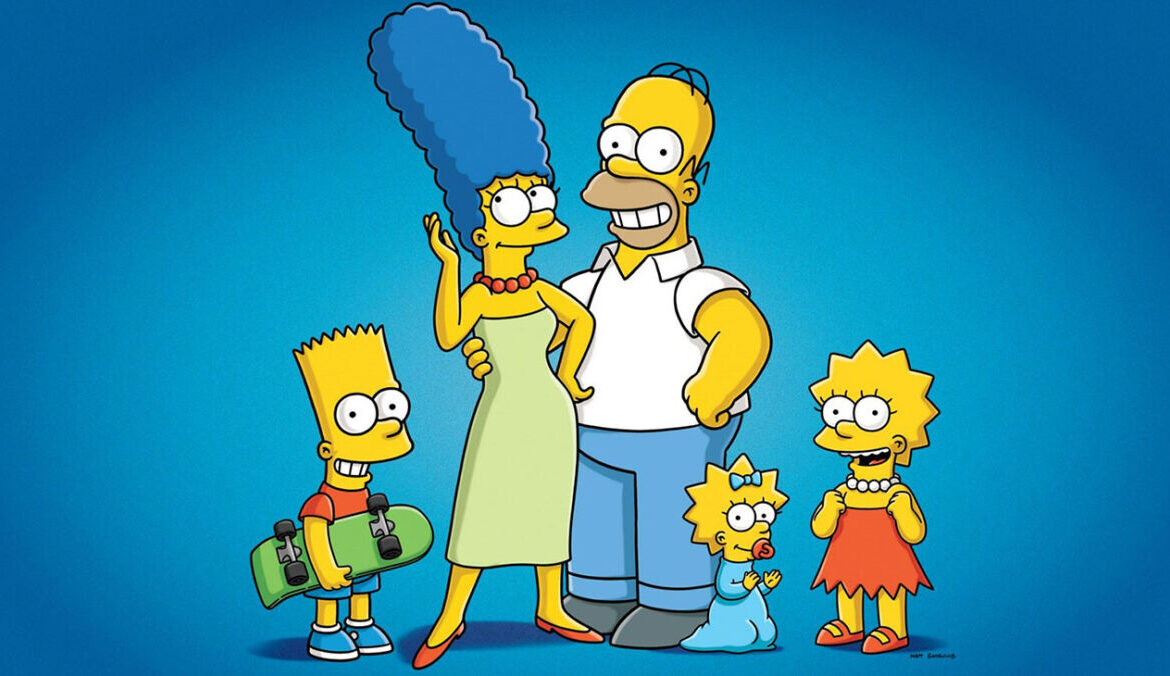Not just any old Simpsons – the Simpsons. The important ones. The famous ones. You know the ones, you’ve seen them.
‘Best’ is always a subjective thing to talk about, particularly in a show like The Simpsons with such a high baseline for quality anyway – but it can’t be denied that some episodes do have that little bit of je ne sais quoi, little moments or images or lines that stick in the mind a little more than they normally would, that still find themselves being talked about years later. These, after a great deal of furious and occasionally tearful debate, are what we’ve narrowed down as the best The Simpsons episodes.
Before we begin, you may well know that there’s a perennial argument over whether The Simpsons is still as good as it once was. But this is not the place to reopen that wound – suffice it to say this is merely a list of the best episodes of The Simpsons, be they from the good seasons or the obviously bad ones.
50. Simpsons Roasting On An Open Fire | Season 1, Episode 1
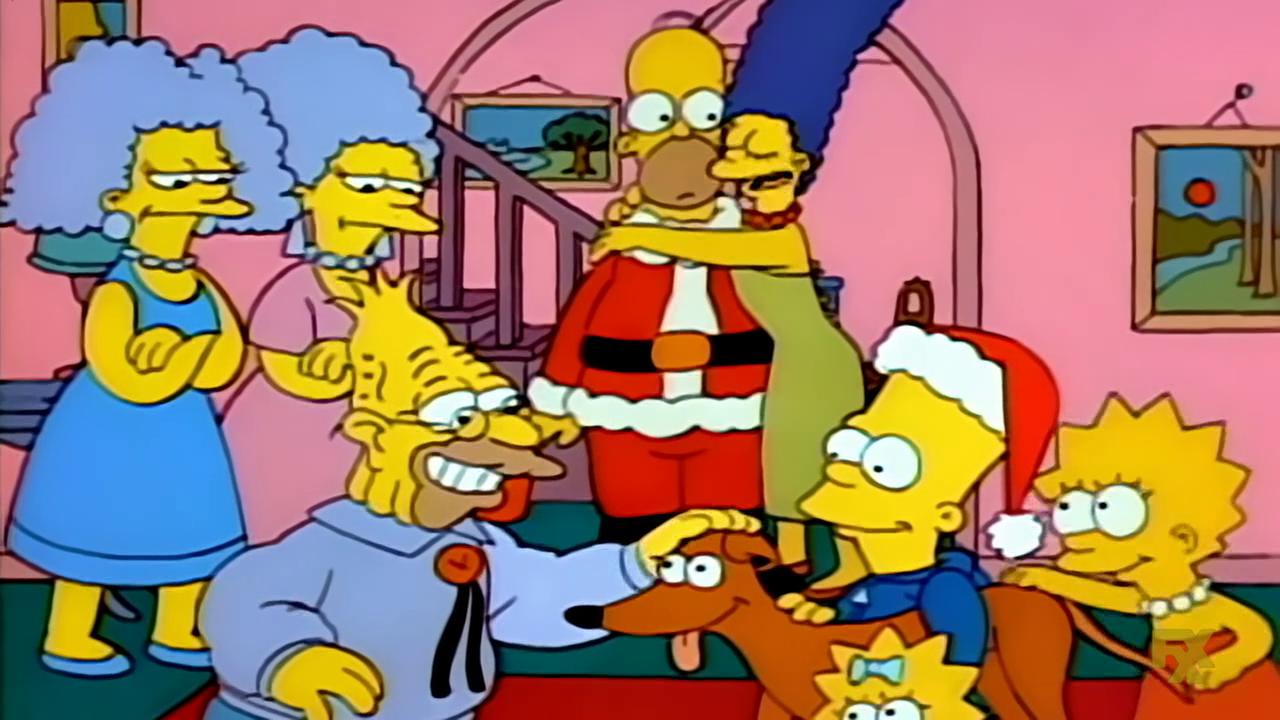
“Oh, please, there’s only one fat guy that brings us presents and his name ain’t Santa.”
Yes, there may well be objectively better episodes of The Simpsons than its first-ever fully-fledged outing, but considering this is literally the genesis of the longest-running animated show in US TV history, it seems appropriate to give Simpsons Roasting On An Open Fire its due. Telling the story of how the now-iconic yellow clan came to own their pet greyhound Santa’s Little Helper as father Homer struggles for money during the festive season, Roasting on an Open Fire is the start of a long and storied cultural legacy.
It’s certainly not a bad episode. In fact, Open Fire has many of the hallmarks that would go on to define what made catching up with this peculiar yellow family from Springfield such a delight: it showcased Homer’s devotion as a struggling lower-middle-class father in trying to provide for his family, it introduced many of the town’s wider cast of oddball inhabitants, and it used the dysfunctional antics of the Simpson clan as its key emotional anchor.
It may not be intrinsically spectacular, but Roasting On An Open fire paved the way for some of the greatest TV of the modern era, and for that reason, it will always be an essential televisual artefact.
49. El Viaje Misterioso De Nuestro Jomer | Season 8, Episode 9
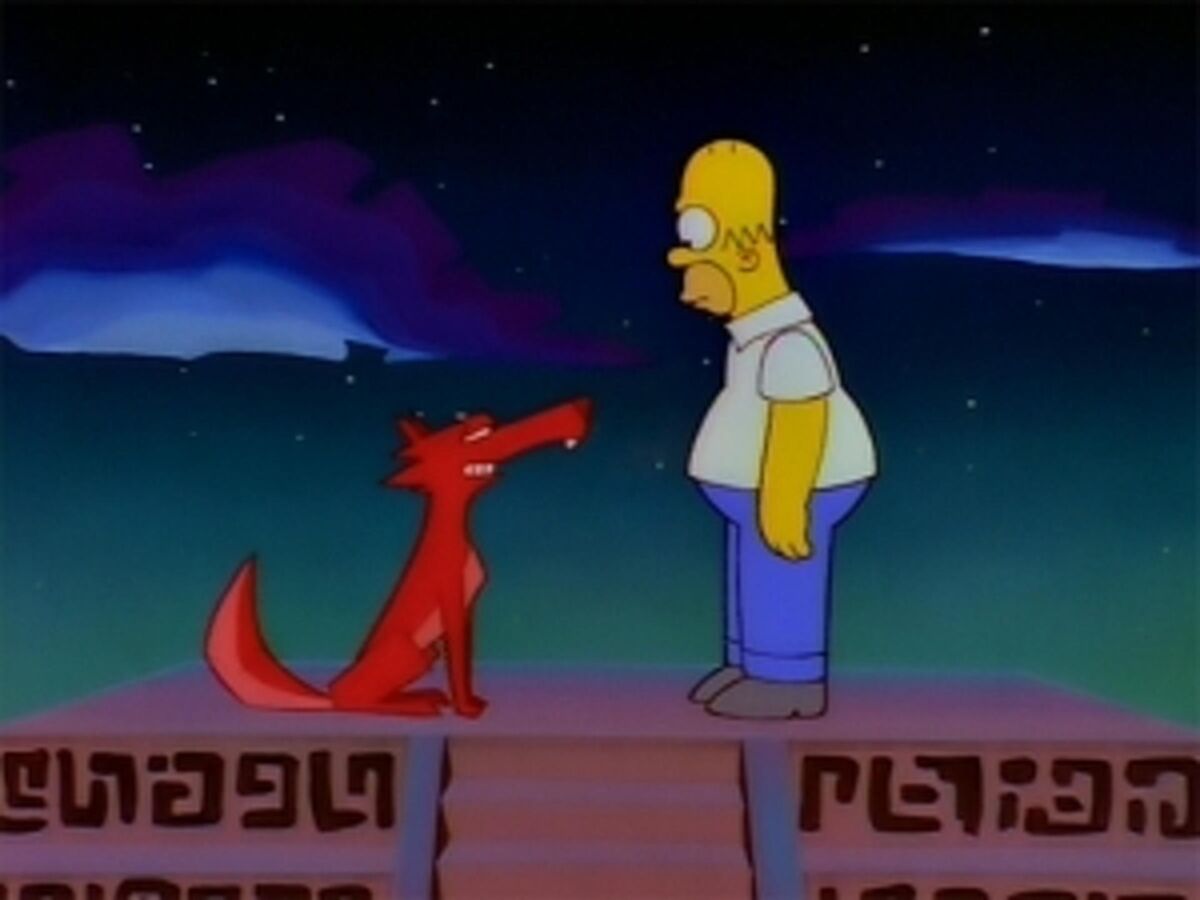
“Should I get rid of all my possessions?”
“Are you kidding? If anything, you should get more possessions. You don’t even have a computer.”
Marge really only has so many ways to stop Homer from single-mindedly pursuing something he wants. When it comes to the annual chilli cookoff, she ups the ante to a full-blown disinformation campaign, deploying a suite of bafflers for almost all five senses in a doomed effort to stop him getting roaring drunk and making a tit of himself in front of the entire town. Despite her best efforts, though, she cannot stand between Homer and a whole festival’s worth of spicy grub.
What elevates this above the many other episodes that boil down to ‘Homer and Marge have a row’ is Homer’s Guatemalan insanity pepper-induced trip. No work of film or television – at least, nothing G-rated – has ever done a hallucination quite this good, letting the animators really stretch out and take us along on Homer’s vision quest, through a strange dreamscape of ziggurats and vengeful tortoises. It also features an excellent turn from the late, great Johnny Cash as the voice of the talking space coyote.
48. Homer’s Phobia | Season 8, Episode 15
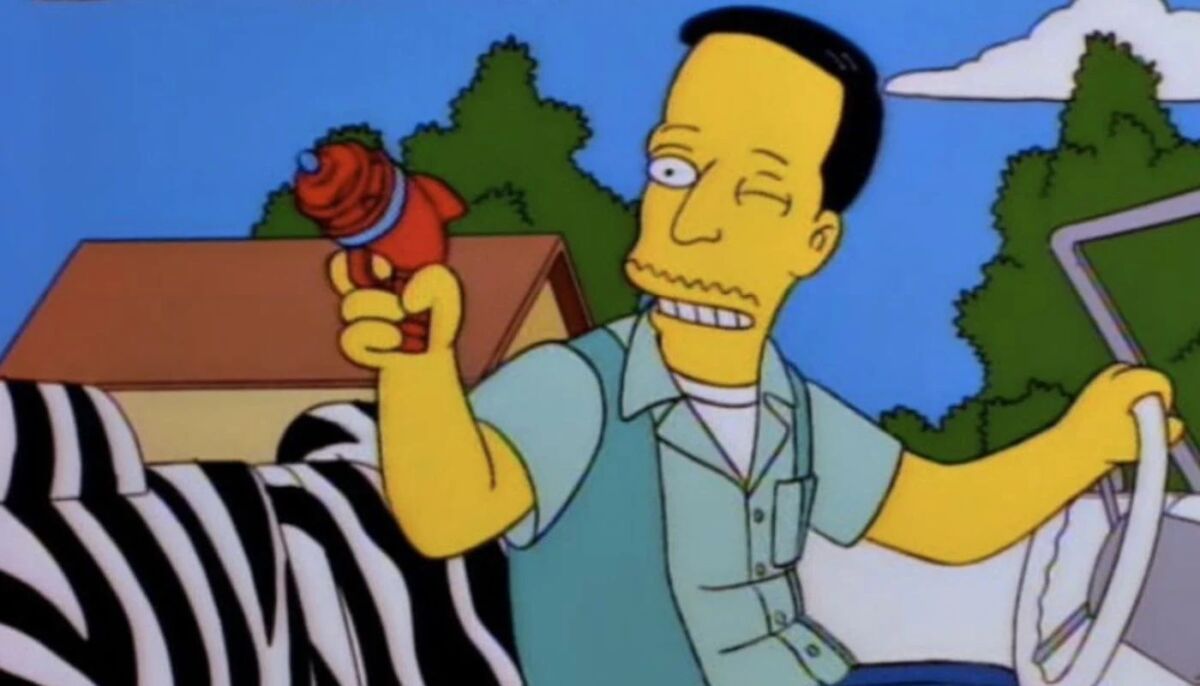
“Dad, why did you bring me to a gay steel mill?”
“I don’t know! This is a nightmare! You’re all sick!”
The Simpsons was never scared of shying away from the big subjects, tackling social and political themes with a light, thoughtful and occasionally provocative touch. It’s rare, however, that an episode would so clearly and so brazenly dig into a singular issue and seek to make a definitive point about it, but one senses that Homer’s Phobia is a clear and naked critique of the intolerances faced by the gay community at the time of its release.
Homer’s Phobia sees Homer enamoured with a charismatic bachelor named John (voiced by and based on John Waters), a lover of all things kitsch and collectable who immediately ingratiates himself with the family with his effortless charm and extroverted amiability. It is only when Homer, a man with no gay-dar whatsoever, is informed that John might be a homosexual rather than a “swinging bachelor”, that his opinion of him suddenly changes and he becomes desperately fearful of the influence John may have on Bart.
Homer’s Phobia, of course, has a very valuable and sincere message, but that doesn’t stop it from being one of the funniest and best The Simpsons episodes ever, slyly toying with stereotypes and perceptions as much as it seeks to confound them. The scene in which Homer takes Bart to a “gay steel mill”, complete with pop-up nightclub, is one of the best in the show’s history.
47. Three Men And A Comic Book | Season 2, Episode 21
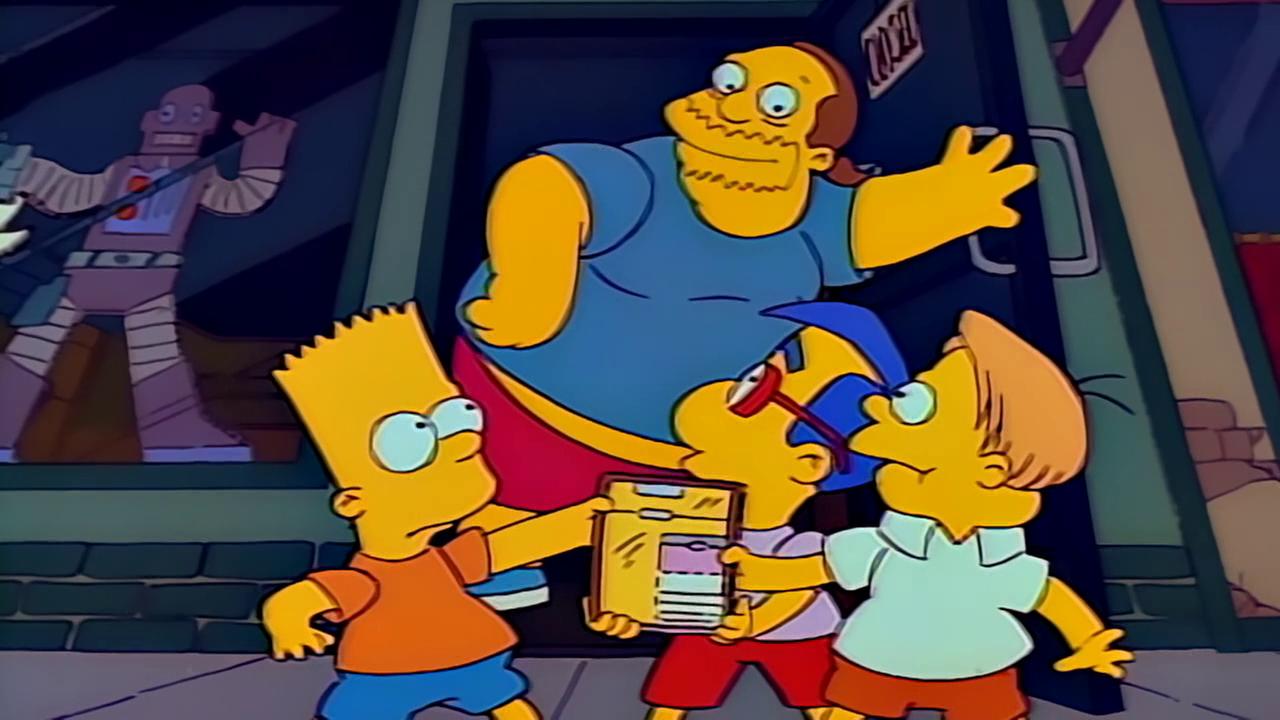
“When I was your age, 50 cents was a lot of money.”
“Really?”
“No.”
The Simpsons has never just been stories of the Simpsons themselves, it’s got a very robust supporting cast – a whole small town’s worth, or at least a lively village – and this episode gave a spotlight to two of Bart’s peers: his sidekick and sometime rival Milhouse, and prissy nerd Martin, as they bond with desperate desire over a rare first issue of cape comic pastiche Radioactive Man.
Small boys getting all excited over a rare edition of a comic book would have seemed a bit antiquated even during the original early-’90s airing, but ultimately it’s not an episode about comic books at all. Rather, the coveted comic is a classic-model MacGuffin, a plot device to set Bart, Milhouse, and Martin at odds, and set them at odds it does – they’re quickly at each other’s throats.
Can three kids glaring at each other really be so very tense? Up in a treehouse, on a dark, stormy night, yes it most certainly can. But, as ever, The Simpsons’ comedic instincts don’t let it descend entirely into a b-movie, with this nailbiting cabin fever interspersed with Homer glancing out the window to see lightning strike the tree while the three boys fight for their lives, and blithely shrug “They’re fine”.
46. Bart Sells His Soul | Season 7, Episode 4
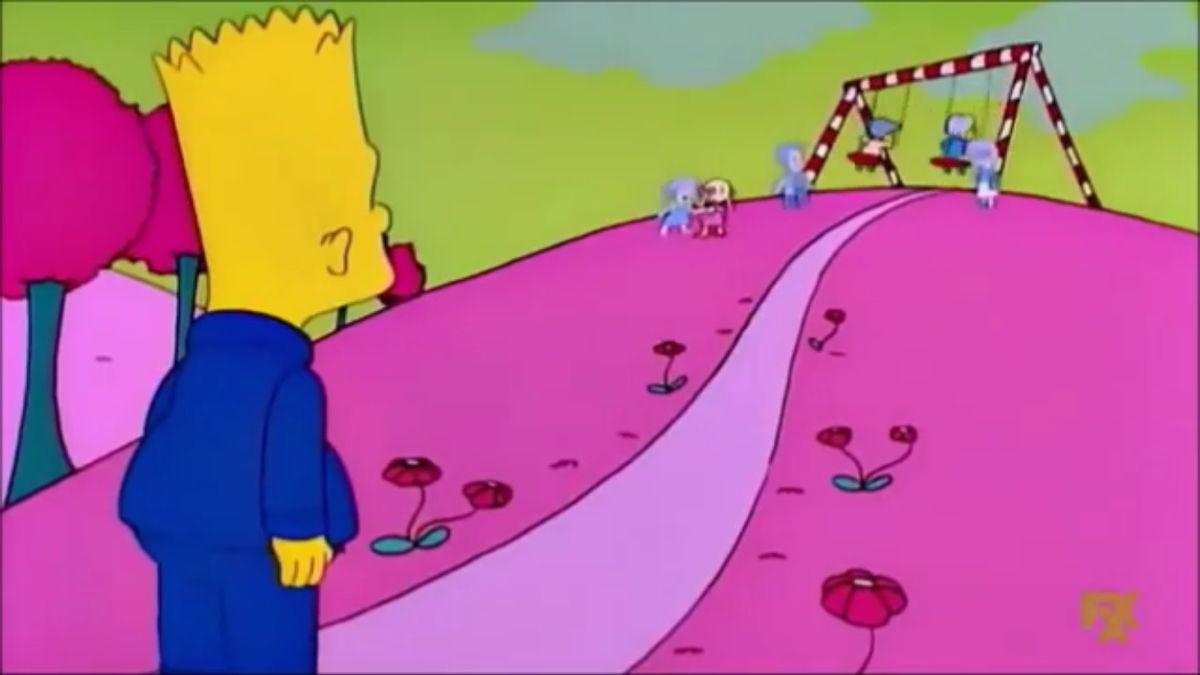
“Come on, Milhouse, there’s no such thing as a soul. It’s just something they made up to scare kids, like the Boogeyman or Michael Jackson.”
Even when you take into consideration the many, many Treehouse of Horror specials that The Simpsons has produced over the years, none come close to the darkness of Bart Sells His Soul. What strikes you most about the fourth episode from Season 7 is how bleak it often is, how uncomfortable and difficult it is to watch “America’s bad-boy” lose his grip on his sanity and his sense of self as a seemingly meaningless transaction with Milhouse renders him a hollow shell of the person he once was.
It’s almost impossible not to be heartbroken for Bart as slowly but surely, the things that truly matter to him – his mother’s love, his own identity, his amusement at things he once found funny – are gradually eroded. A scene in which Marge feels a barrier between herself and Bart’s “soulless” body when hugging him is particularly throat lump-inducing. That’s why Bart Sells his Soul is one of the best The Simpsons episodes – it isn’t a tribute to the idea of religion or the spiritual, it’s a meditation on what is valuable to us all, to those things we cannot live without: the love of others, our self-identities and, of course, our sense of humour.
45. Homer Badman | Season 6, Episode 9
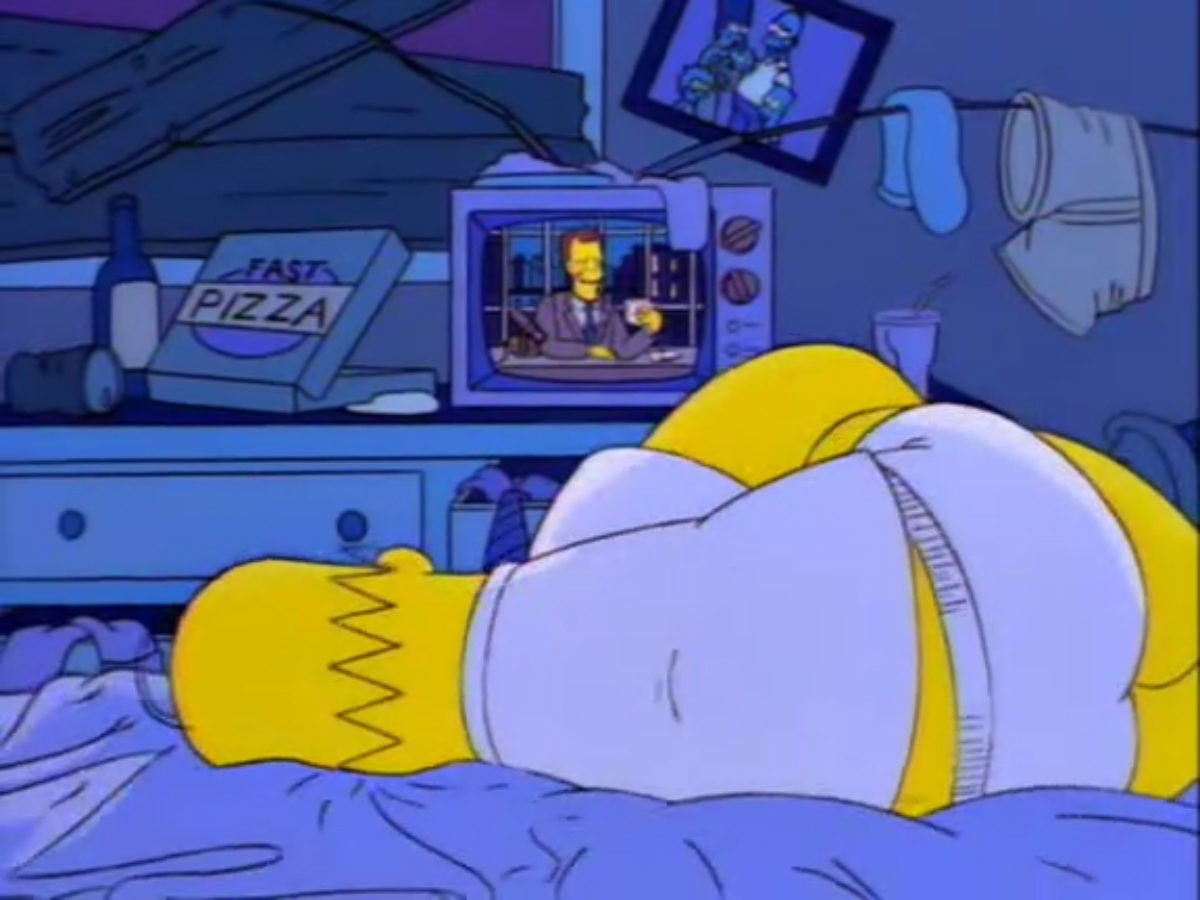
“There’s no way to see into the Simpson home without some kind of infrared, heat-sensitive camera…so, let’s turn it on.”
For all of Homer’s faults, he’s a fundamental innocent, a being whose basic instincts go in the direction of gentle creature comforts, and who is utterly incapable of guile. This is probably why they were able to do an episode where he’s accused – even falsely – of sexual assault, and it was constructed skilfully enough that it hasn’t gone down the memory hole, like that episode with Michael Jackson.
Despite that heavy topic, it all starts out in the silliest, most light-hearted way imaginable, with a visit to a candy convention (Homer insists on bringing Marge, despite the fact she’ll hate it, since she can carry off more candy). And it’s the candy, specifically a very rare gummi Venus de Milo (“created by gummi artisans who work exclusively in the medium of gummi”) that causes all the problems in the first place.
Groping isn’t a topic that would be joked about so easily today, compared to the wild west of the 1990s, but Homer becoming the hapless center of a media circus only resonates more and more as the information age gets ever more intense. Having the paparazzi long-lens you as you get out of the shower may seem ridiculous, but these days it’s only one nasty headline away for all of us.
44. Radioactive Man | Season 7, Episode 2
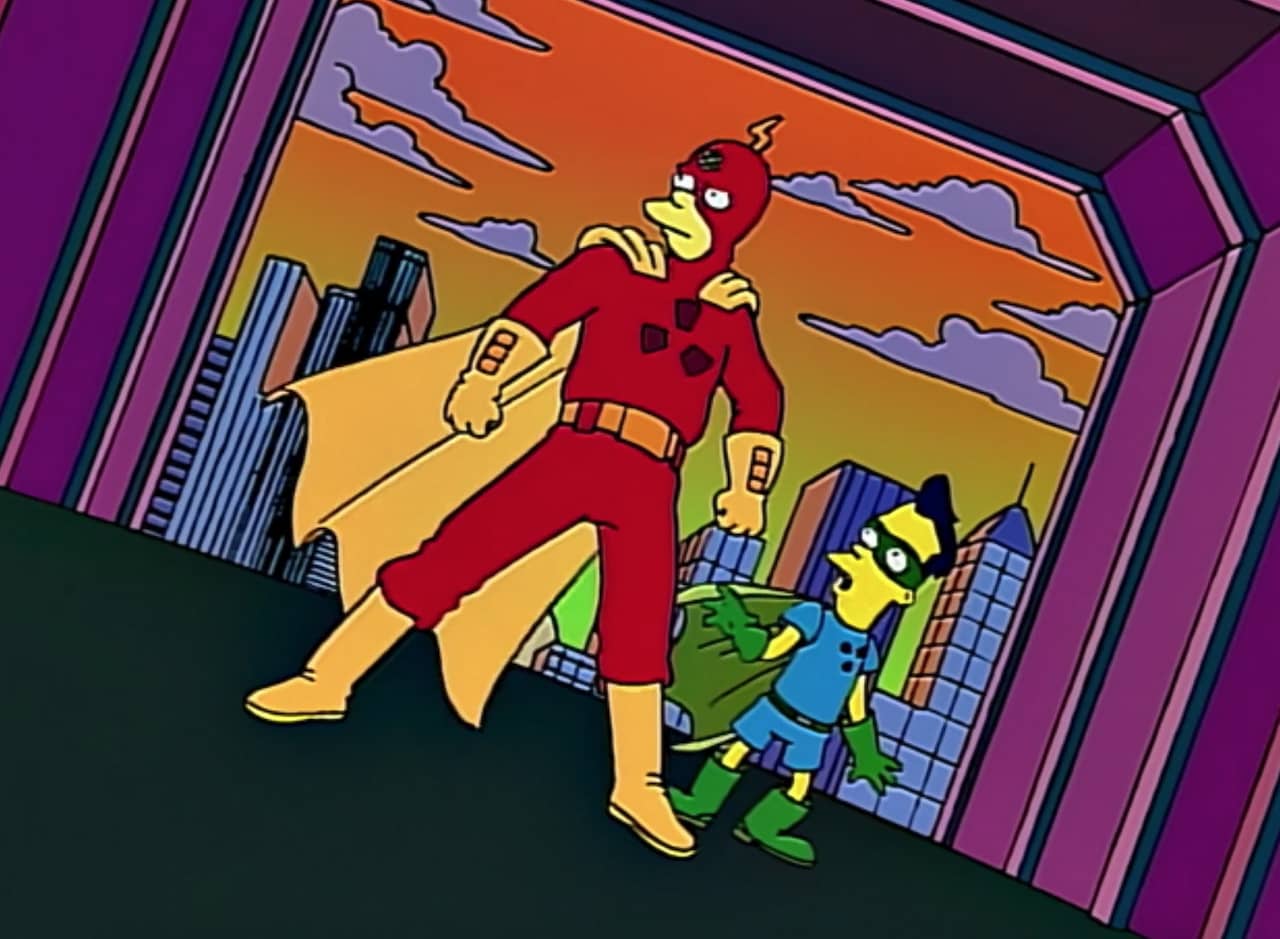
“My eyes! The goggles do nothing!”
Hollywood and the movie industry never fare well when the Simpsons’ writers unsheathe their talons on the vapidity of Tinseltown, and nowhere is this disdain more in evidence than in Season 7’s ‘Radioactive Man’. Following the announcement that the latest superhero comic blockbuster ‘Radioactive Man’ is to be shot in Springfield, the town is gripped by a media frenzy as speculation rages as to who will be cast as the eponymous hero’s faithful sidekick, Fallout Boy.
Despite Bart’s best efforts to bag the role, it instead goes to his own faithful stalwart Milhouse, but the pressures of fame and a ravenous, relentless industry prove too much for him to bear and he soon begins to loathe his time in the public spotlight. A cynical portrayal of how Hollywood treats its actors, especially how it manipulates and exploits its child stars, Radioactive Man is Swartzwelder and co. in fully cynical satire mode. The scene in which the upcoming movie’s producers reminisce about the campy original, a direct reference to Adam West’s tongue-in-cheek Batman show of the 1960s, is a particular highlight.
43. Mr. Lisa Goes To Washington | Season 3, Episode 2
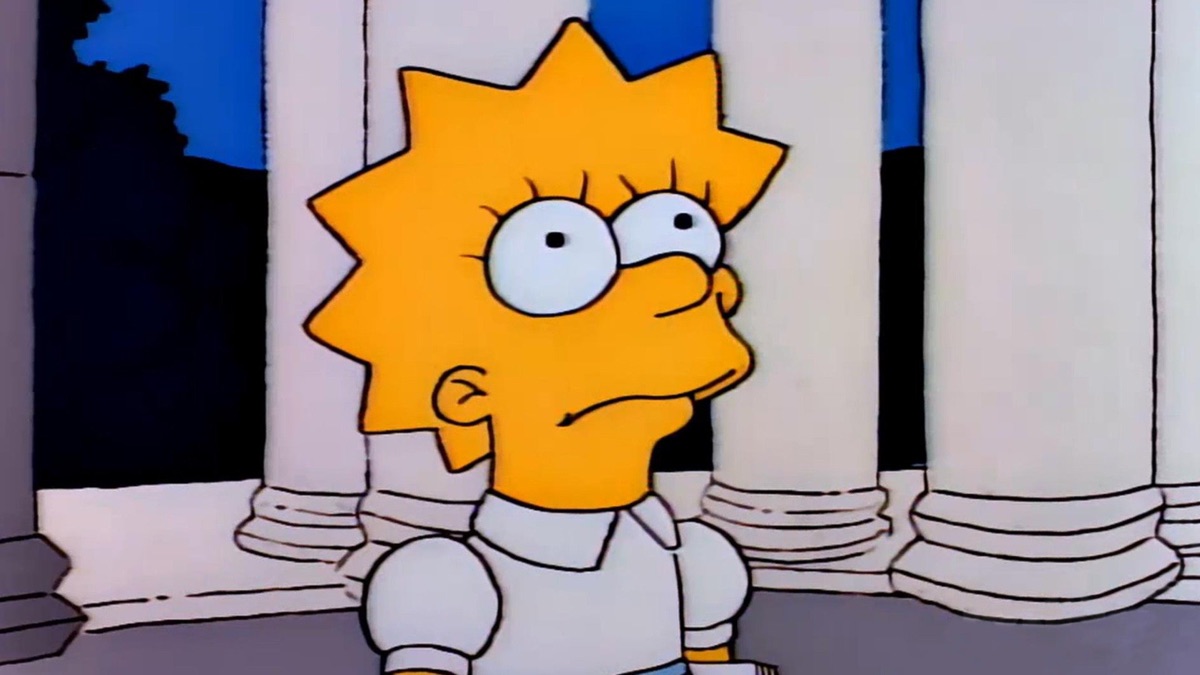
“That’s why whenever I see the stars and stripes, I’ll always be reminded of that wonderful word ‘flag’.”
Patriotism is supposedly the last refuge of the scoundrel, but it’s also pure comedy fodder. Here, a simple essay contest turns into furious, firebrand rhetoric about all the things you wouldn’t have without “six white stripes, seven red stripes, and a hell of a lot of stars”. And in this game, as Bart is happy to concede, Lisa is very definitely the favourite to win.
One of the first real travel episodes, the whole family ends up going to Washington D.C. and taking in the sights when Lisa gets through to the finals – staying, of course, at the Watergate, notorious in a way very few hotels are. And, in a welcome touch of self-awareness, there’s a dig at the tendency of political comedy to forget the ‘comedy’ part of the equation, with one of those ‘funny’ songsters warbling endlessly on about the deficit and quickly drawing Bart’s displeasure.
Mr. Lisa Goes to Washington ends up being curiously idealistic coming from the show that was willing to stick it to formerly untouchable authority figures (from the church to the teevee dad), with then-President George H. W. Bush, a sworn enemy of the show, proudly overseeing the arrest of a corrupt politician. Still, they’d get their own back years later when Homer punched him in the face.
42. The PTA Disbands | Season 6, Episode 21
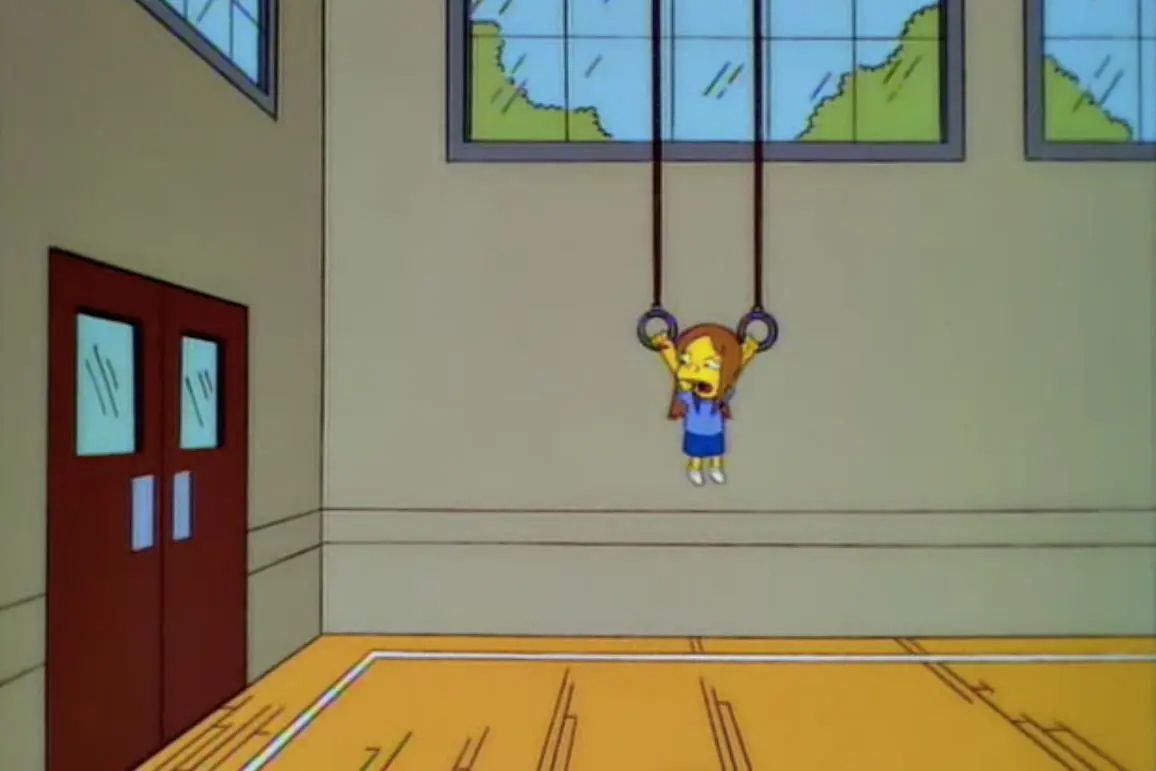
“Only two synonyms? Oh my god! I’m losing my perspicacity!”
The Simpsons writers had many targets to lampoon during the show’s heyday: the misinformation of the sensationalist media, the vacuous power of TV and celebrity culture, and of course the corruptive influence of big businesses on politics and wider society. One of the areas that took the most punishment, however, was the American schools system, a broken, underfunded juvenile detention complex characterised by apathetic teachers, disaffected students and a woeful lack of proper resources.
Sick of only having books that were “banned by other schools” at her disposal (“well, the children have to learn about Tech Wars sooner or later!”), Mrs. Krabbapel, egged on by Bart’s manipulation, calls a teacher’s strike and in doing so forces the PTA to find replacement substitutes in the form of Springfield’s even more underqualified citizenry.
The point of The PTA disbands isn’t for the audience to take sides with the strike’s two central and opposing figures. Both are working in conditions not fit for purpose, Skinner hamstrung by a lack of state funding and Krabbapel (and her peers) forced to muddle through as a result. The real criticism was far more of an America that placed more value on vacuous pursuits and trivial issues than the futures of its own children. For shame.
41. Homer The Smithers | Season 7, Episode 17
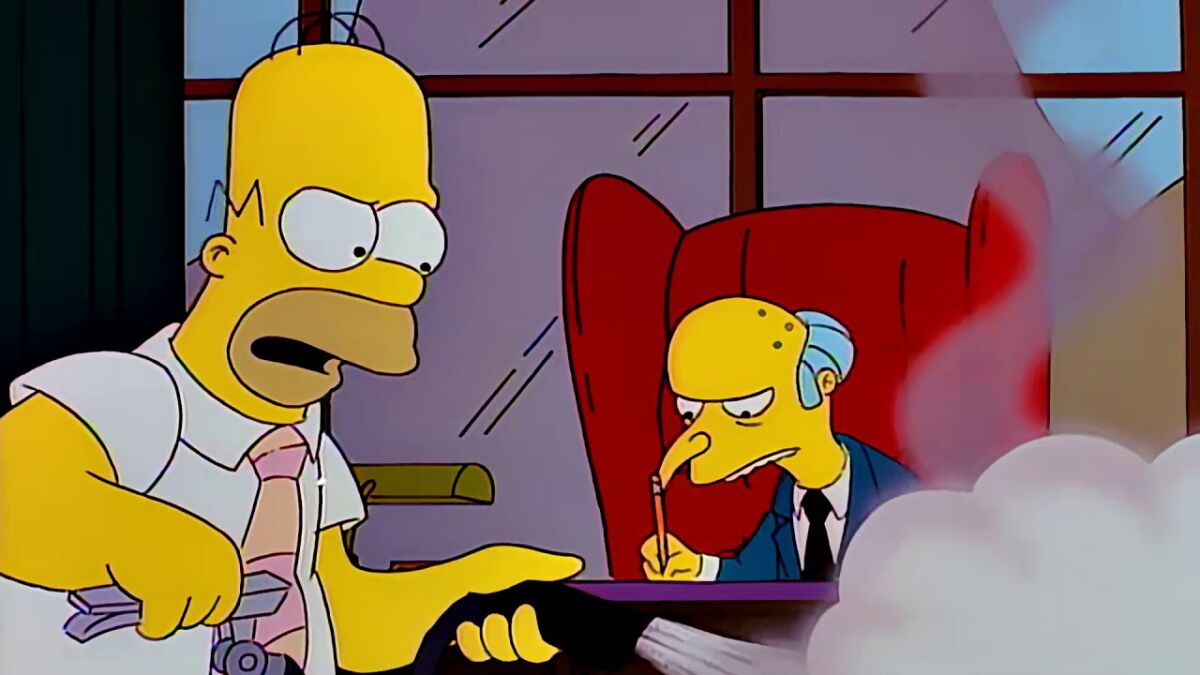
“Your new duties will include answering Mr. Burns’s phone, preparing his tax return, moistening his eyeballs, assisting with his chewing and swallowing, lying to Congress and some light typing.”
Homer’s boss, Mr Burns, is a strong feature of this list and bordering on being the sixth Beatle of The Simpsons, but what of his assistant, Waylon Smithers? What’s the deal with him? (You know what I mean.) Even with a desperate, unrequited crush, could anyone else in the world stand to be a combination of butler, valet, secretary, and sometimes bodyguard to a profoundly ungrateful man?
The answer is no. With Homer drafted in as a replacement Smithers can be confident won’t outshine him, the strain of peeling dead skin, building supercomputers, and trying not to set the kitchen on fire quickly becomes too much. And, when the final straw (being called a “travesty of a joke of an assistant”) comes, Homer gives Burns the sock in the mouth that, in all honesty, the man’s had coming for a while.
But this gives us a very unexpected turn when, petrified and trying to survive without an assistant, Burns accidentally ends up becoming self-sufficient, able to brew his own coffee and answer his own phone, gauche as it may be. Which all just creates further problems when Smithers gets back from his holiday. Like an odd little frog, he has adapted to his evolutionary niche, and trying to replace him has a ripple effect.
40. The Boy Who Knew Too Much | Season 5, Episode 20
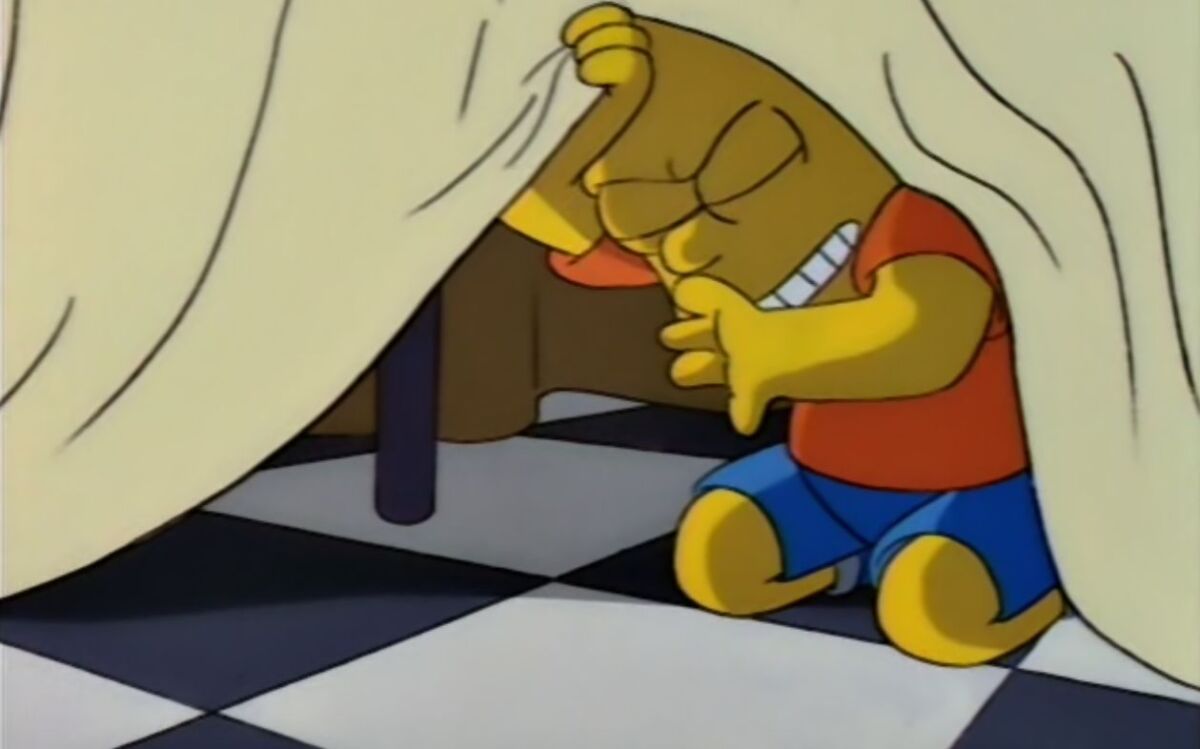
“Am I so out of touch? No. It’s the children who are wrong.”
There’s a general rule in the world of Simpsons writing: if it’s penned by John Swartzwelder, it’s likely to be a classic. Swartzwelder’s particular style of slightly literary, reference-laden work has given life to some of the best The Simpsons episodes, and in The Boy Who Knew Too Much one sees him firing on all cylinders. When Bart witnesses Mayor Quimby’s loudmouth nephew Freddie’s altercation with a clumsy French waiter while playing truant, he must decide whether to come forward with his knowledge of Freddie’s innocence or stay silent to avoid revealing the fact that he bunked off school.
It’s always good to see Bart wrestle with his conscience and ultimately do the right thing, but the episode’s opening sequence is one of the best in Simpsons history. A shameless parody of The Terminator and Westworld, the put-upon and spineless stooge goes full Green Beret in order to track down his truant nemesis, reminding audiences just how terrifying Skinner can be when you get on his bad side.
More than most, The Boy Who Knew Too Much is crammed full of literary and cinematic references that somehow still don’t feel particularly dated or clumsy. Homer’s dissent on the jury at Freddie Quimby’s trial heavily references 12 Angry Men, while Bart’s idyllic rural fantasies as he yearns to bunk off school are laden with the imagery of Twain and the idealised South.
39. Homer At The Bat | Season 3, Episode 17
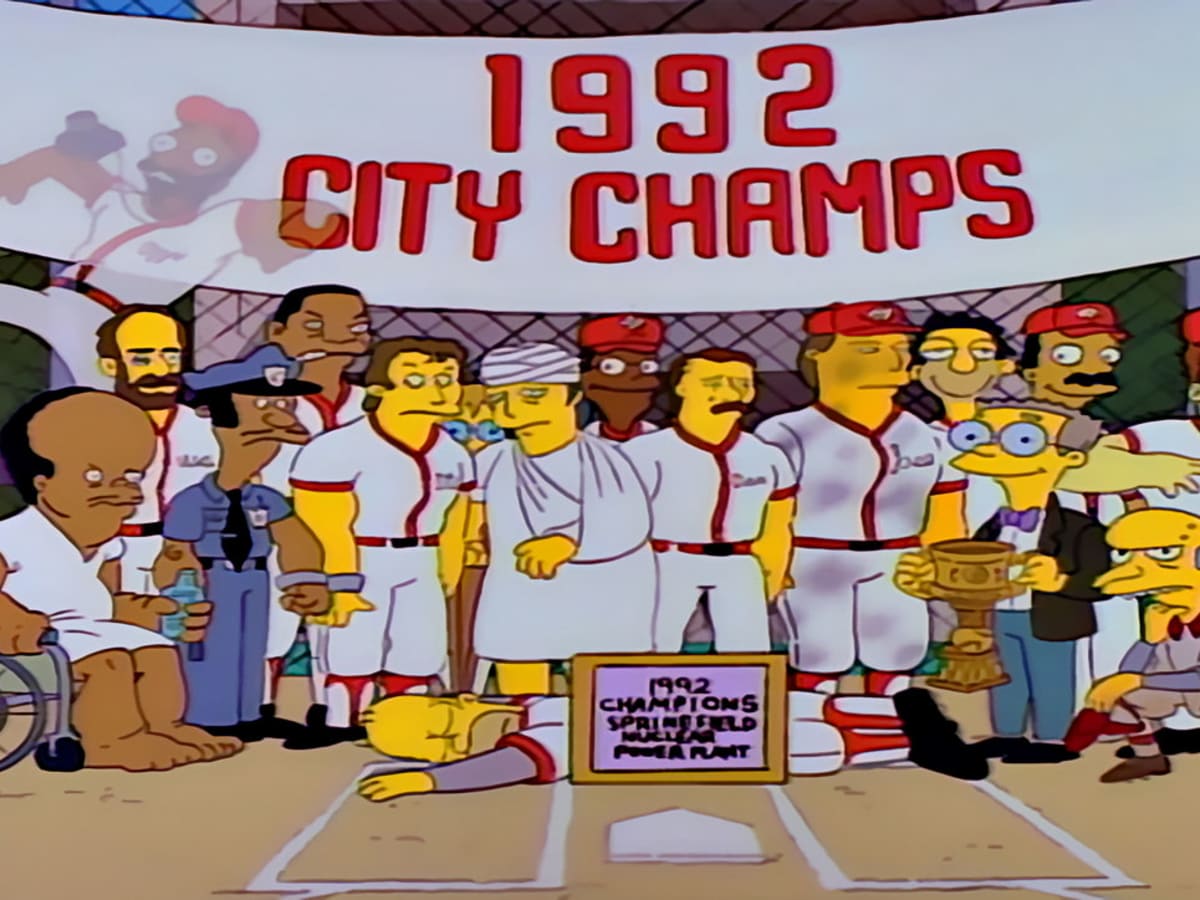
“You make me sick, Homer. You’re the one who told me I could do anything if I put my mind to it.”
“Now that you’re older, I can tell you that’s a crock.”
The Simpsons has always been able to attract A-list cameos, and in this case, a whole team’s worth of all-star baseball players. But what separates The Simpsons from its lesser imitators is that it doesn’t just get helplessly, fumblingly starstruck at being in the same room as important celebrities, but instead remembers to use them for comic effect.
When Burns declares that his nine ringers could never suffer nine separate misfortunes before the big game, you both immediately know what’s coming and also want to see it play out. Whether it’s through police corruption, unsafe tourist attractions, or their own sheer hubris, Springfield quickly proves too much for the crème de la crème of 1990s baseball – apart from Darryl Strawberry, who like Homer is a right fielder (“Are you better than me?”/“Well, I’ve never met you…but yes.”)
Perhaps what’s best of all is that Homer doesn’t have to abruptly become a baseball superstar all of his own for it to all work out okay. His secret weapon, wonderbat (“a very special, magical piece of wood…that I could build a bat out of”) gives him the edge on the field against Springfield’s other wheezing slugs, but the show doesn’t need to pretend an overweight father of three could realistically out-baseball the absolute top tier of the sport.
38. Burns’ Heir | Season 5, Episode 18
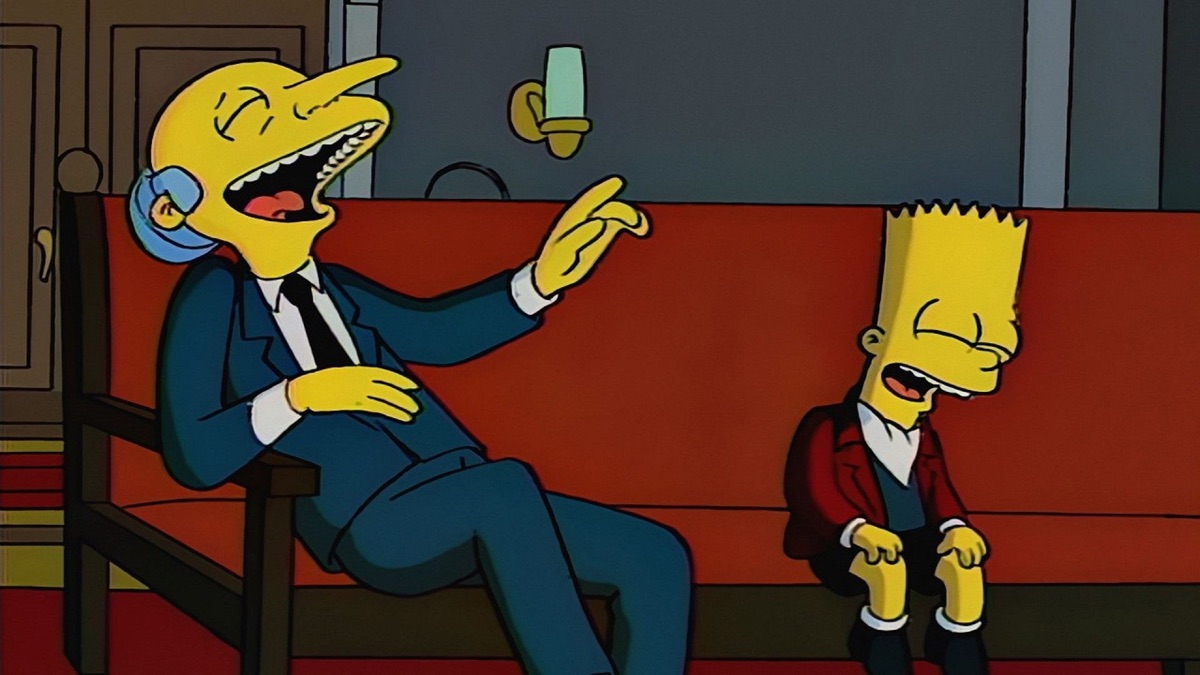
“Ooh, he card read good!”
One of the central themes of The Simpsons is the idea of dissatisfaction and disillusionment with one’s mediocre lot. Homer constantly tries to escape his lower-middle-class grind, hence his myriad of one-time careers, Lisa feels disaffected by her role as a liberal intellectual in a more conservative environment, Marge is often trapped by domestic drudgery, and Bart yearns for freedom, status and material possessions to gain his own warped version of what one might term fulfilment.
Burns’ Heir is an exploration of this desire to improve one’s situation in life, to break the apparent shackles of living a comfortable yet precarious life and instead strive for the untold riches of society’s elite. In winning Mr. Burns affections and becoming his heir, Bart is set to inherit the tyrannical businessman’s massive fortune, but he ultimately discovers that his place is with the people who actually care for him. The episode’s message is clear: money doesn’t buy you happiness. Not forever, anyway.
37. Bart Gets An Elephant | Season 5, Episode 17
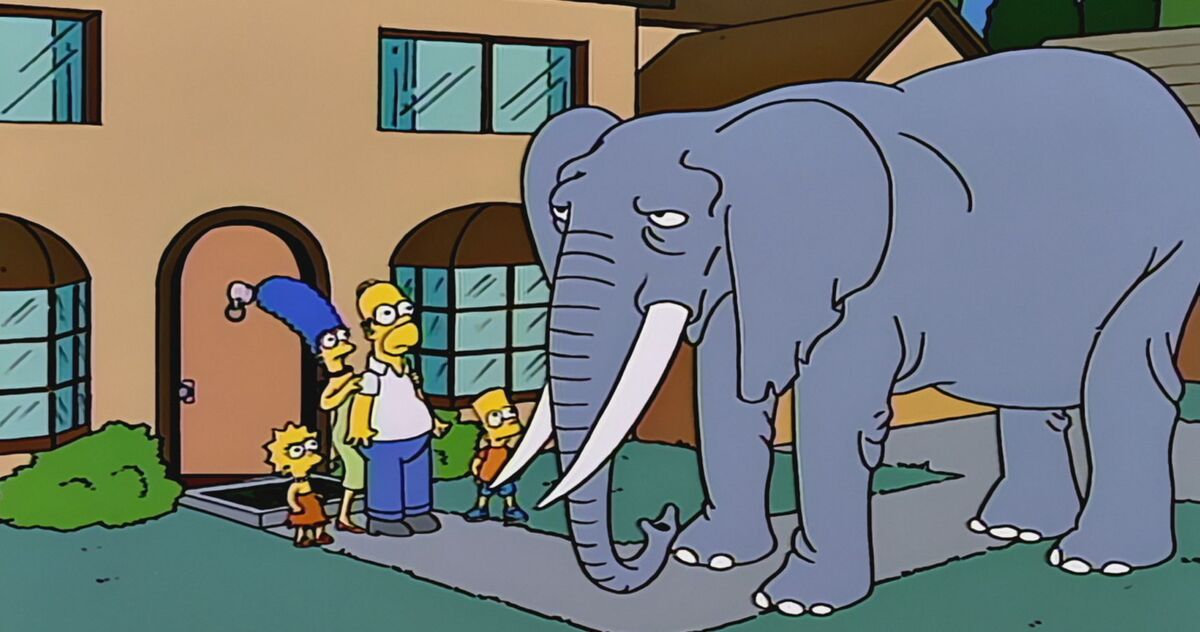
“I’m alive! I’m alive! And I owe it all to this feisty feline.”
“Dad, feline means cat.”
“Elephant, honey. It’s an elephant.”
Some titles are fanciful and metaphorical, only barely alluding to the actual content of the work to which they’re applied. ‘Bart Gets an Elephant’ is absolutely not one of those. Nor is the event of the title a consolation prize they only get around to right at the end, no, they start gearing up to it straight out of the gate. And realistically, what small boy, given the chance, could bring themselves to turn down the offer of a full-grown African elephant?
Bart’s new pal Stampy lives out most the usual beats of the boy-and-his-dog story, albeit here it’s not a dog, it’s a beast the size of a house which could and does wreak havoc throughout Springfield. Naturally, this includes the heartbreaking moment when the boy may have to give up his beloved pet because it’s too expensive to feed (which is more understandable for a creature which eats a fifth of a ton of vegetation every day).
This quickly goes beyond sentimental and back into funny when we meet amiable ivory dealer Mr. Blackheart (“Well, I’ve had lots of jobs in my day: whale hunter, seal clubber, president of the Fox Network. And, like most people, yeah, I’ve dealt a little ivory”). Off the back of one scene and about six lines, The Simpsons makes the man utterly unforgettable – other cartoons don’t make their main characters quite so memorable.
36. Treehouse of Horror IV | Season 5, Episode 5
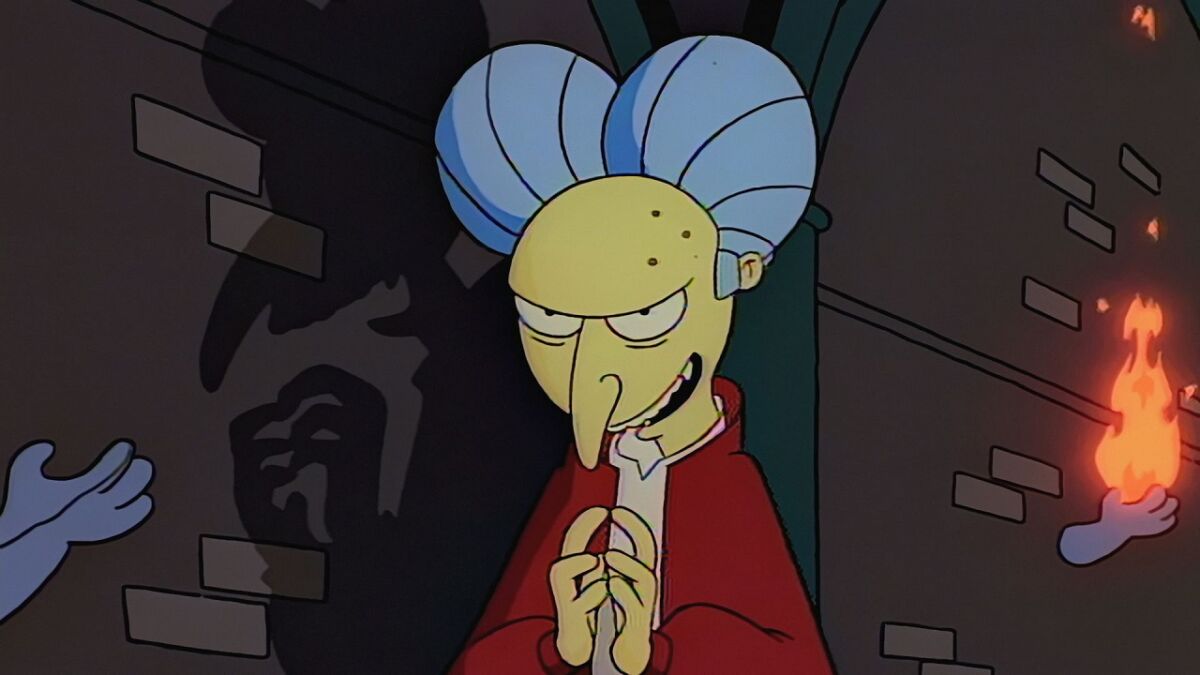
“Oh, you Americans with your due process and fair trials. This is always so much easier in Mexico!”
All the classic Simpsons-era Halloween specials are terrifying treats, and Treehouse of Horror IV is no different in its non-canonical indulgences in all things horror. Things open with one of the most memorable Halloween segments in Simpsons’ history as Homer quite literally sells his soul in order to procure a doughnut from the Devil’s own stock. The scenes in Hell are particularly iconic, the ‘Ironic Punishments Division’ of Hell Labs, in which Homer relentlessly chomps his way through “all the doughnuts in the world”, is an absolute certified classic.
Next is a parody of the classic Twilight Zone episode Nightmare at 20,0000 Feet (now reduced to just 5 ½ feet) as Bart’s protestations regarding the presence of a demon attempting to sabotage the school bus fall on deaf ears, a neat little minisode that plays off the strength of its source material and the single location of its narrative.
Rounding out the trilogy is Bart Simpson’s Dracula, a peerless spoof of Bram Stoker’s infamous work of horror that sees Mr. Burns, now the infamous blood-sucking Count, attempting to drain the necks of The Simpson clan. Highly parodic of the camp, slightly ludicrous nature of its source material, Bart Simpson’s Dracula wrings most of its humour from the dunderheaded ignorance that horror protagonists often display in the face of pure evil. Homer is the prime example (“Oh Lisa, you and your stories. Bart is a vampire. Beer kills brain cells”), although Marge’s concern that “today he’s drinking blood, tomorrow he could be smoking” is an equally delightful gag.
35. One Fish, Two Fish, Blowfish, Blue Fish | Season 2, Episode 11
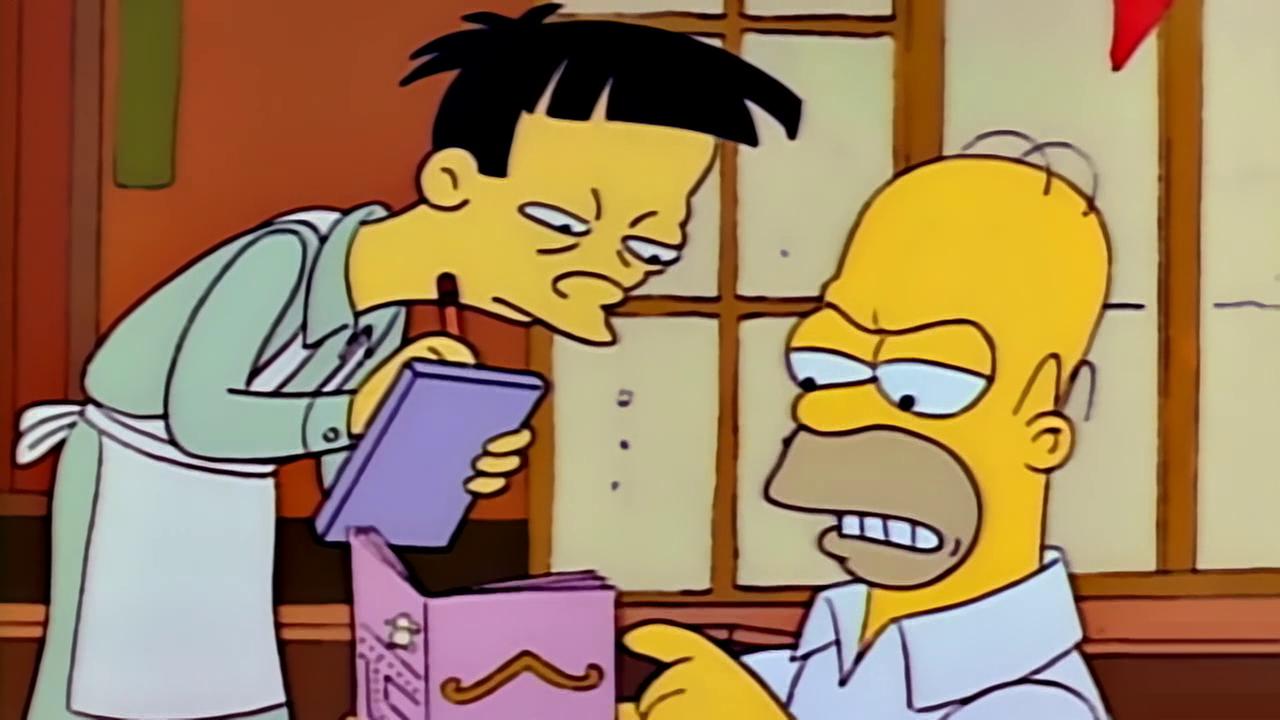
“Don’t panic. There’s a map to the hospital on the menu.”
In a way, this one’s more a time capsule of the early ‘90s than most, with the Simpsons fascinated by the mysterious, newfangled, alien phenomenon of – sushi restaurants, of all things. But things get timeless, and startlingly real, when Homer ends up gobbling down some famously lethal fugu fish.
It’s usually a bad sign when comedies lean too heavily on the sentiment – but when a guy’s staring down the barrel of his own mortality, that’s not mere sentiment, that’s something which we’ll all have to deal with sooner or later. And so the funny yellow man who goes “d’oh” gently says goodbye to his wife and children, and goes to look oblivion in the eye. Most serious dramas don’t let people face death with this much dignity.
Usually the bucket list is just a turn of phrase, a fanciful way of talking about stuff you’d really like to do. Here it’s the stuff Homer genuinely wants – nay, needs – to tick off the list while he still has the time on earth to do so. And this would weigh heavier than a comedy should, if it wasn’t tempered throughout by bits which would be incredibly callous if they weren’t so funny (“Joke’s on him, I’ll be dead by then!”).
34. Brother From The Same Planet | Season 4, Episode 14
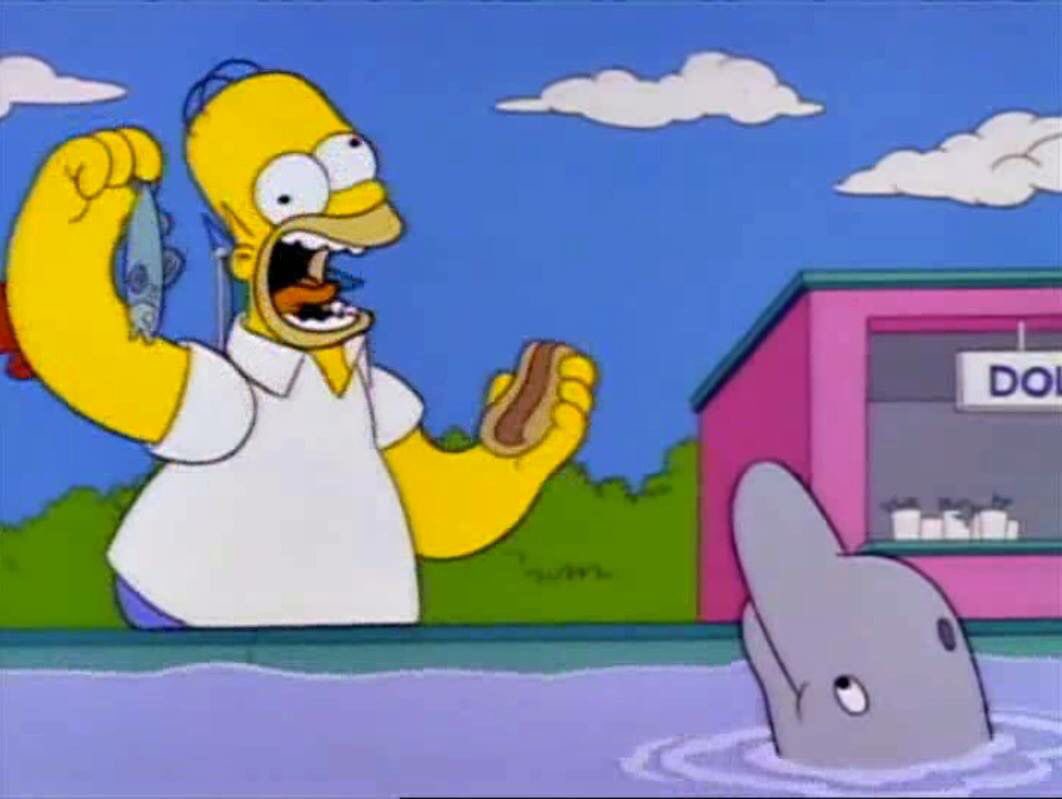
“This is even more painful than it looks…”
If Homer’s Enemy sees the emergence of what would go on to be described as ‘Jerkass Homer’, the seeds had already been sewn way back in Season 4 of The Simpsons, with Brother From The Same Planet. Fed up with Homer’s lax parenting, Bart pretends to be fatherless and neglected in order to gain a bigger brother, a replacement patriarch who just happens to be everything that Bart’s real father isn’t: athletic, intelligent, effortlessly cool and perennially attentive.
If ever there was an outing that shone a light on Homer’s inadequacies as a father and Bart’s ruthlessness as a son, it’s Brother From the Same Planet. There’s a genuine mean streak running through the episode, with Bart fully aware of the suffering he is causing his dad.
Meanwhile Homer, unwilling or oblivious of the need to make a change in his behaviour, showers his clumsy affection on an adoptive boy of his own, the doe-eyed urchin Pepi, rather than fixing his relationship with Bart in the first place. It may be tough to see one of the family’s central dynamics at such loggerheads, but their eventual reconciliation is made all the more rewarding as both ultimately realise, to an extent at least, the error of their ways.
33. The Front | Season 4, Episode 19
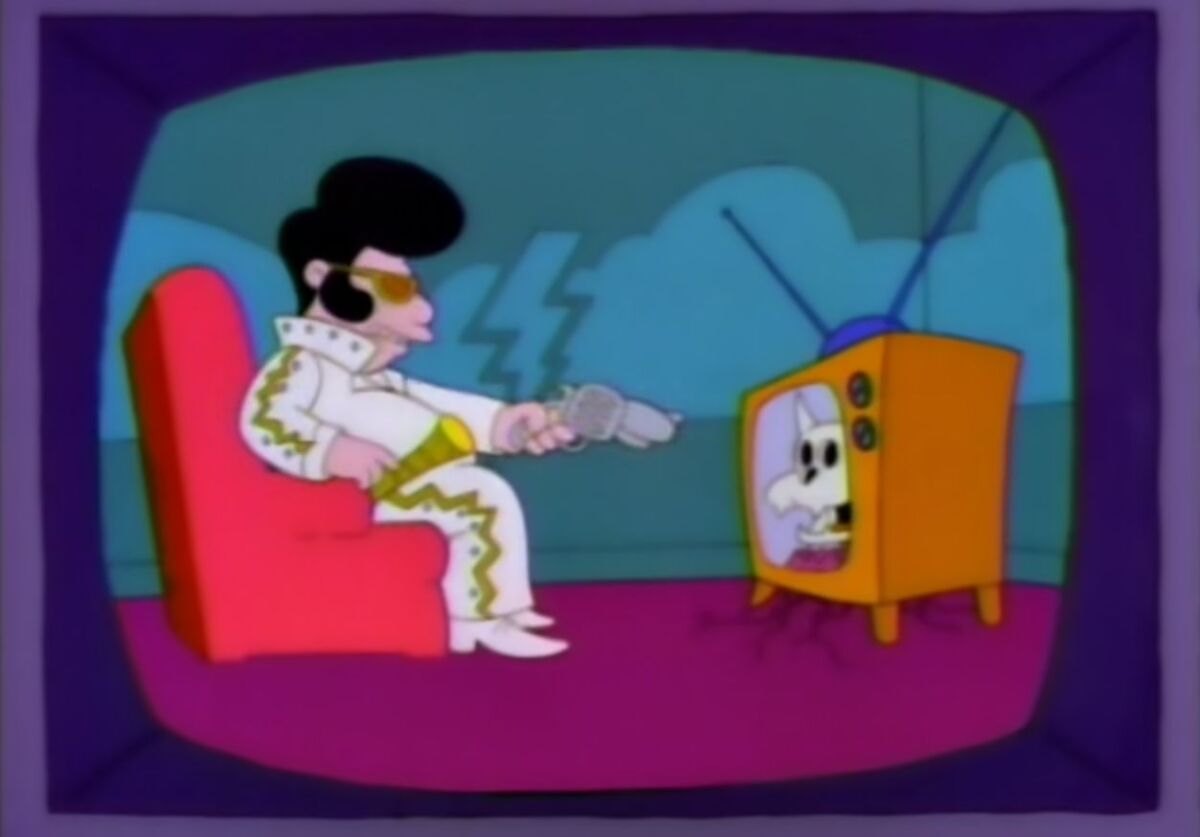
“Cartoons have writers?”
“Ehh, sort of.”
The Simpsons may have made the animated comedy genre its own, but they were aware of and willing to tip the hat to the cartoon classics that had gone before them – not least in the form of Itchy & Scratchy, an ultraviolent pastiche of Tom & Jerry, the Roadrunner, and pretty well every cartoon where funny animals try to kill each other. With the show growing stale, Bart and Lisa have a go at writing their own episodes.
Needless to say, two lively, red-blooded American children have little difficulty writing situations so over-the-top violent they become funny. But it’s also an opportunity for the writers to have a little fun with the whole dirty business of animation, with the studio head letting Bart and Lisa in on the reliable cost-cutting measure of looping backgrounds as they repeatedly walk past the same water-cooler.
Aptly, while the kids dip their toes into the world of work, Homer and Marge are going back to school – initially for a high school reunion, and then so Homer can scrub out the stain of never actually graduating. As plots go it’s not an action-adventure or sci-fi epic, but does have the simple joy of Homer getting a plunger stuck on his head.
32. Lisa the Beauty Queen | Season 4, Episode 4
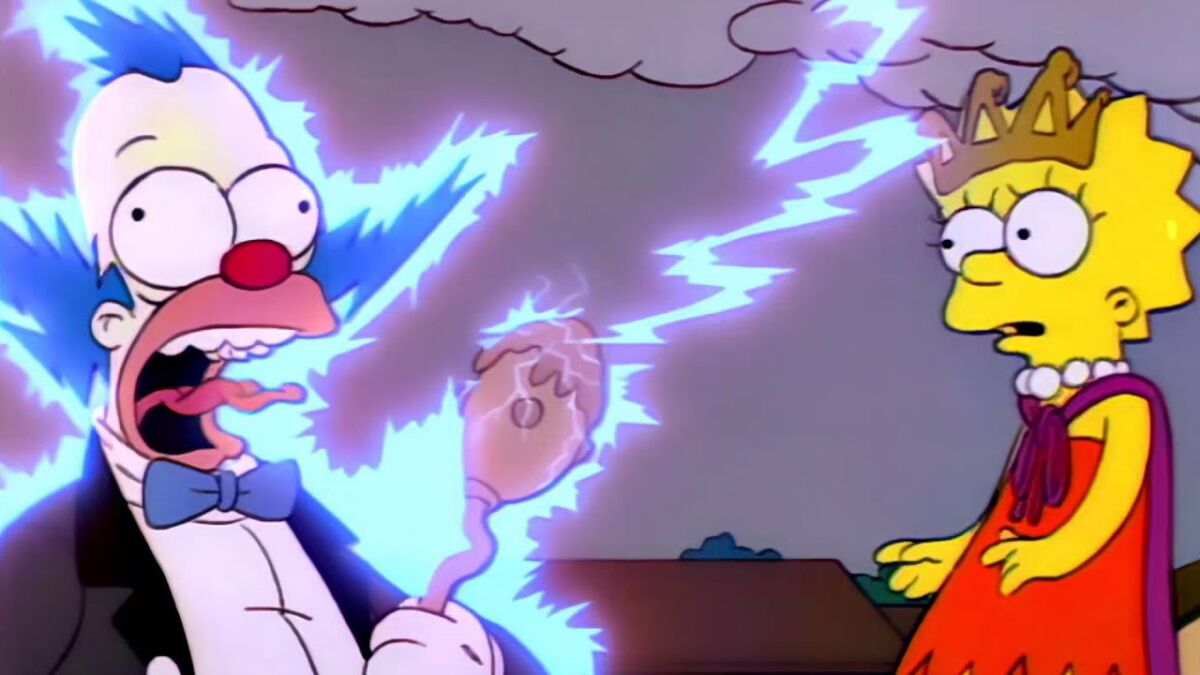
“Oh, ain’t that cute? Makes Little Debbie look like a pile of puke!”
Season 4 is full of brilliance, one of the first seasons of The Simpsons that really started to meld comedy and warmth to brilliant effect, and in few places is that more evident than Lisa the Beauty Queen. After a street cartoonist portrays her in an unflattering light, Lisa’s self-esteem plummets as she frets that she may be ugly, a worry that leads her to become reclusive and depressed. Concerned for his daughter’s wellbeing, Homer stumps up $250 to enter his daughter in the local ‘Little Miss Springfield’ pageant in a bid to make Lisa realise how beautiful he thinks she really is.
The real strength of Lisa the Beauty Queen is that it has so much of the heart that would increasingly go missing as the show began to decline. Even if Lisa doesn’t feel she stands much chance against her more pageant-savvy competitors, it’s her family’s genuine belief and support for her that really shines through. The fact that Homer sells his one chance at a ride on the Duff Blimp to fund Lisa’s entry is as apposite as it is strangely moving, his unerring belief in his daughter’s worth as touching as they are sincere. If ever there was an episode to prove that the Simpson family love one another, it’s this.
31. Summer of 4 Ft. 2 | Season 7, Episode 25
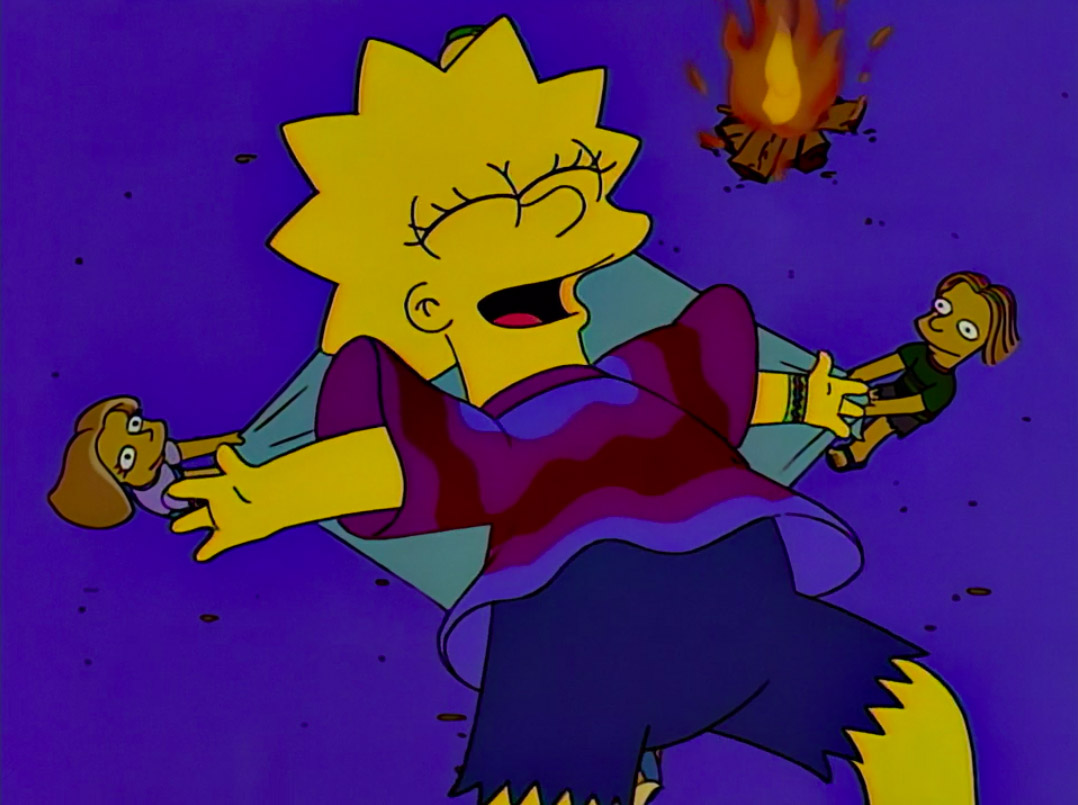
“Celebrate the independence of your nation by blowing up a small part of it.”
We’ve written before that this episode, coming at the end of The Simpsons’s seventh season, has the feel of a finale to it – not least because it ends on the family driving off into the sunset. More pointedly, it has the perpetually eight-year-old Lisa run into some proto-adolescent growing pains at the end of the school year, realising as all nerds must that microscopes are a scanty replacement for friends.
But a summer vacation to the Flanderses’ beach house in Little Pwagmattasquarmsettport (“It’s known as America’s scrod basket”) offers the perfect opportunity for a bit of reinvention. Equipped with clothes other than pearls and orange dress, suddenly Lisa’s in with the popular kids and Bart is the one who’s sidelined and watching with envy. And his having brought Milhouse, the dud to end all duds, along for the ride is no sort of consolation prize.
Lisa’s new gang and Bart’s jealousy are the meat of it, and, in all honesty, most of the veg as well. But there’s still time for Homer’s vacation antics, be it harmless fun like turning a doormat into a bathing suit, or his sublime attempts to buy illegal fireworks at the local corner store.
30. Mother Simpson | Season 7, Episode 8
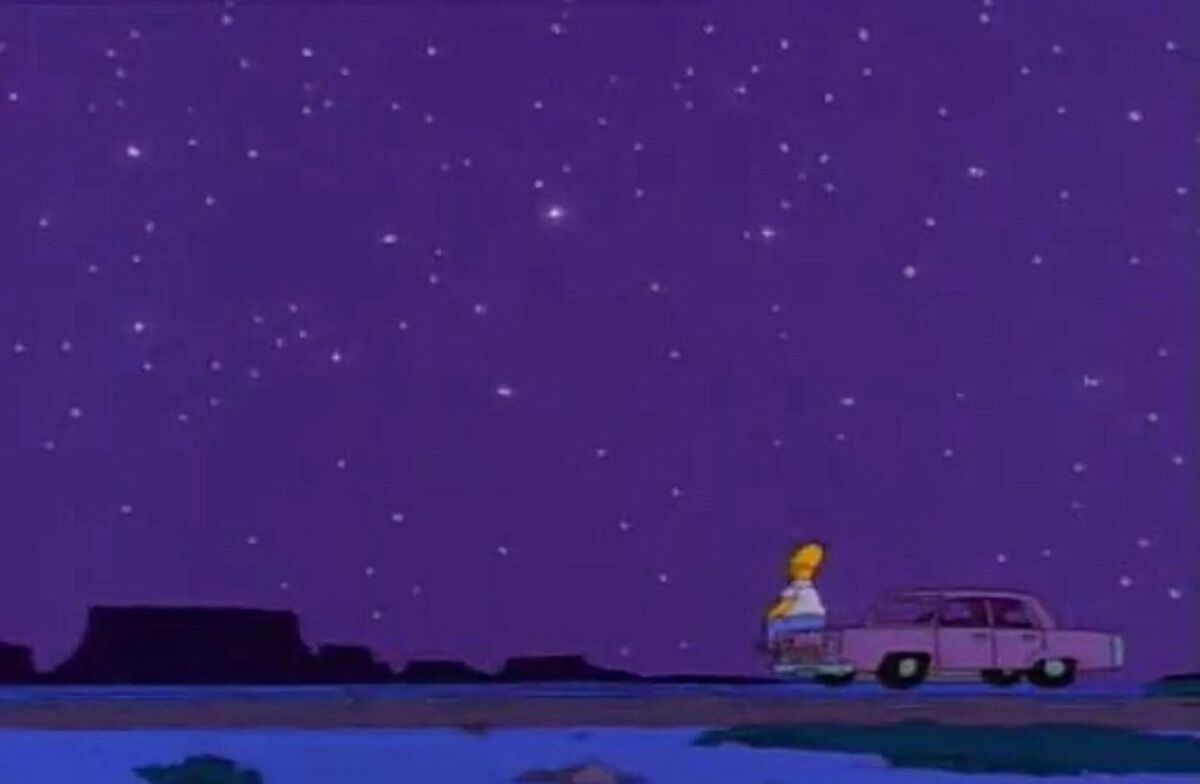
“Remember, whatever happens, you have a mother, and she’s truly proud of you.”
Oh, Simpsons, why do you have to tug at the ol’ heartstrings?
Mother Simpson, like many of the best Simpsons adventures, starts off with a seemingly innocuous and unrelated opening scene as Homer fakes his death via a dummy to avoid cleaning litter on his day off. However, considering that most Springfield residents now think that he has truly passed on, he is forced to visit the Springfield Hall of Records, where he discovers that his mother, Mona, did not in fact die as his father had always told him, the pair reuniting when Homer falls into his own vacant grave.
Mother Simpson is the first of Glenn Close’s 11 guest appearances as Homer’s estranged mum, the gentle, sensitive rebel contrasting with Homer’s dunderheaded foolishness and capacity for blind rage. What’s great about Mona is that she’s very much written with the other characters in her life in mind: she and Homer share the occasional bouts of clumsiness, she and Bart have the same rebellious, anti-authoritarian spirit, while the ex-hippie gives Lisa validation that she isn’t, in fact, the only member of the family conscious of social or political issues. Mona Simpson was clearly crafted with great attentiveness and care, the writers showing a respect for their characters that would increasingly be lost as the show’s quality waned.
Mother Simpson is a seamless combination of humour and heart, from Homer’s inexplicable knowledge of the work of Walt Whitman to his ruining of his reunion with his mother by somehow attracting a large stork. The episode is best known, of course, for its ending, a poignant and subtle denouement that still ranks as one of the sweetest, and saddest, of The Simpsons’ long run.
29. Two Cars In Every Garage And Three Eyes On Every Fish | Season 2, Episode 4
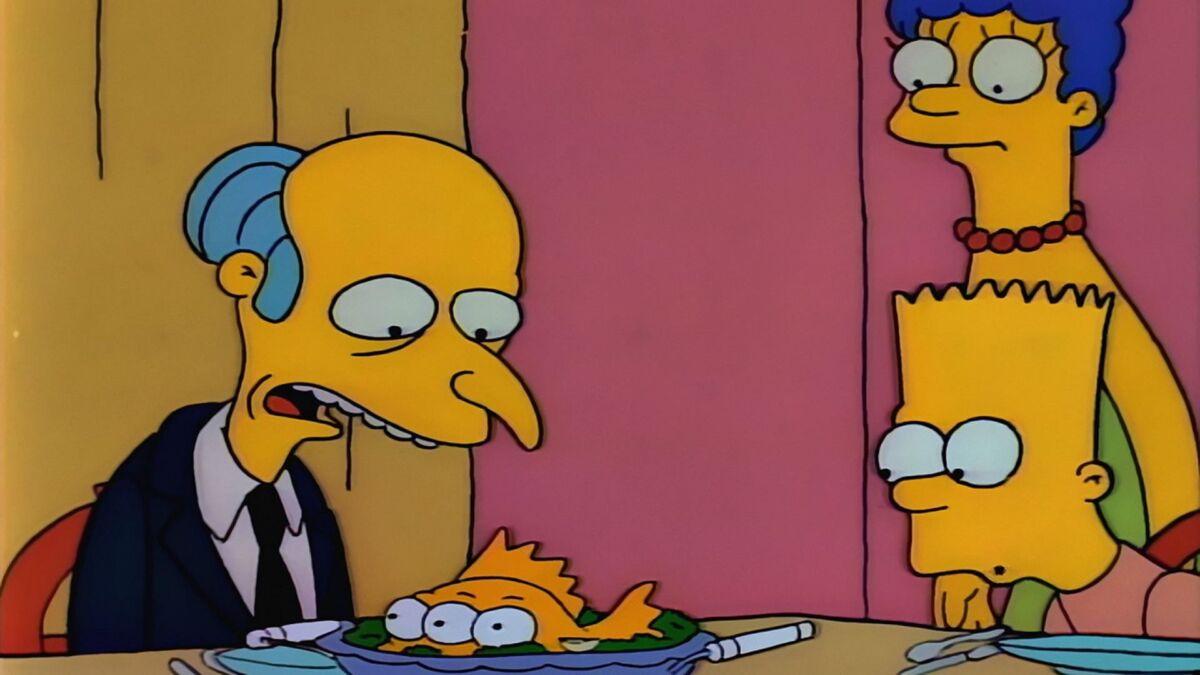
“If I was governor I’d find better things to do.”
“Such as?”
“Getting Washington and Lincoln’s birthdays as separate holidays. President’s Day! What a rip-off!”
Springfield’s resident villain Mr Burns finds yet another way to, as he likes to put it, “tighten my stranglehold on this dismal town” – in this case, by running for governor after one of Homer’s mouth-of-babes moments sets a lightbulb going in his mind. The election quickly reaches fever pitch, especially when it splits the Simpsons household down the middle.
Even for the dog-and-pony show that is politics, Burns runs a ridiculously empty campaign, going through the motions of photo-ops and offering only the laziest actual policies (“And I say taxes are too high!”), while privately disdaining the whole affair as much as anyone would after having seen how the sausage is made. You can name your own real-life example of this – there are of course plenty to go around.
What kicks all this off, though, is Bart landing a three-eyed fish from the waters adjoining Burns’s nuclear power plant. Burns’s hired retinue of political operators and an actor portraying Charles Darwin do their level best to keep this fairly damning creature forgotten about – until, finally, they can’t, resulting in a quite spectacular implosion (not literally).
28. Deep Space Homer | Season 5, Episode 15

“Careful! They’re ruffled!”
I’ve always thought that the new version of jumping the shark has to be going to space. There’s usually something of the desperate rearing its sorry head when a show or film decides to take its usually Earth-bound antics intergalactic, like when Fast and Furious 9 finally decided to go the whole hog and head to the stars in some souped-up Mustangs.
This was the fifth season of The Simpsons, however, nestled happily within the golden age of a show that wouldn’t become stale and irrelevant for a few more years yet. To all intents and purposes, Deep Space Homer simply shouldn’t work, but it’s so fantastically well-written, aided by great cameos from James Taylor and Buzz Aldrin, that it ends up an utter triumph.
Deep Space Homer boasts so many iconic Simpsons bits, from Kent Brockman welcoming our new alien overlords to Homer losing out on employee of the month to a carbon rod, stuffed into one wonderful package. For an episode to spawn its own meme and even have a copy placed on the International Space Station for astronauts to watch is a testament to its lasting quality.
27. Kamp Krusty | Season 4, Episode 1
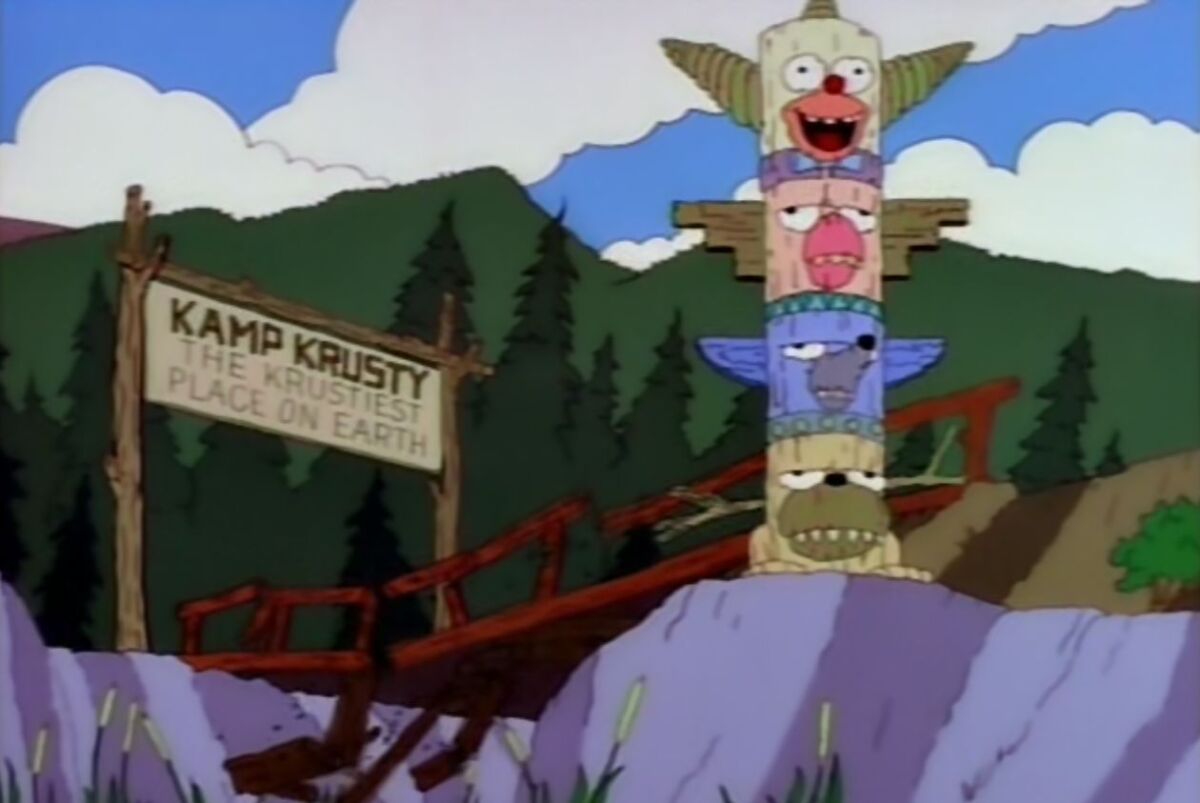
“Lisa, I’ve been thinking it over. Next summer, I’m getting a job.”
Krusty the Klown’s whole thing is a tears-of-a-clown setup, with the makeup masking something else, only instead of ‘tears’ it’s more likely to be ‘cheap gin’. Beneath the tenuous child-friendly veil lies a decidedly child-unfriendly, philandering, gambling, cigarette-end of a man. As such, you can probably guess how the dream summer vacation experience that is Kamp Krusty might turn out.
But while my cynicism here is definitely shared by the writers, the whole affair wouldn’t work nearly so well if Bart and Lisa weren’t taken in by Krusty’s usual surface-level wholesome presentation. Having been gulled completely, they’re looking forward to it, they actually think they’ll get the unforgettable summer shown in the adverts, the poor sods.
The Simpsons once said of itself “that horrible act of child abuse became one of our most beloved running gags”, and they’re playing the same trick here. Subjecting Springfield’s innocent vulnerables to the horrors of Kamp Krusty manages to come round the other side through sheer melodrama and become funny again (“I’ve been to Vietnam, Afghanistan, and Iraq, and I can say without hyperbole this is a million times worse than all of them put together”).
26. I Love Lisa | Season 4, Episode 15
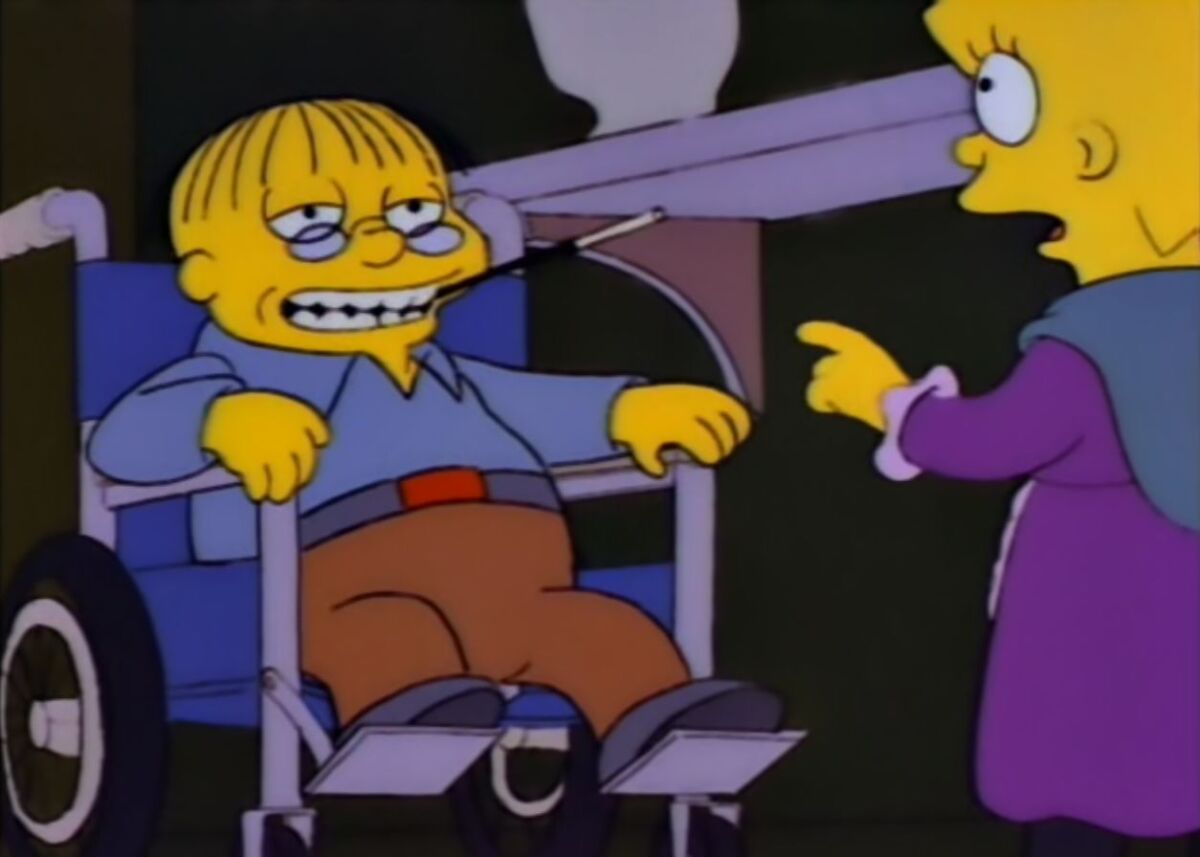
“And if that doesn’t work, six simple words: I’m not gay, but I’ll learn.”
While child-centric episodes of The Simpsons do have an understandable predilection of playing into the show’s more juvenile tendencies, some of the best storylines can also be found amid the dilapidated halls and rusted playgrounds of Springfield Elementary. One of the funniest and most emotionally grounded of Season 4’s impressive roster is I Love Lisa, which sees Ralph Wiggum become infatuated with the eldest Simpson daughter after she presents him with a pity card on Valentine’s Day. As Ralph becomes more besotted by Lisa, however, she struggles to conceal her lack of reciprocity before brutally rejecting her would-be boyfriend on national television.
While I Love Lisa could have devolved into a story in which Ralph was nothing more than the butt of the gag, it’s probably the most dignity he is ever afforded. As a result of his rejection, Ralph stops being a dopey one-line simpleton and takes on a three-dimensional form, displaying genuine hurt that his naive and innocent affection for Lisa has been spurned in a way that he doesn’t fully understand. Seeing Ralph flourish as the star of the school’s production of the life of George Washington has to be the peak of a character so often used as the perennial stooge is as refreshing as it is rewarding.
Maybe Ralph isn’t stupid. Maybe he’s just a bit different.
25. Rosebud | Season 5, Episode 4
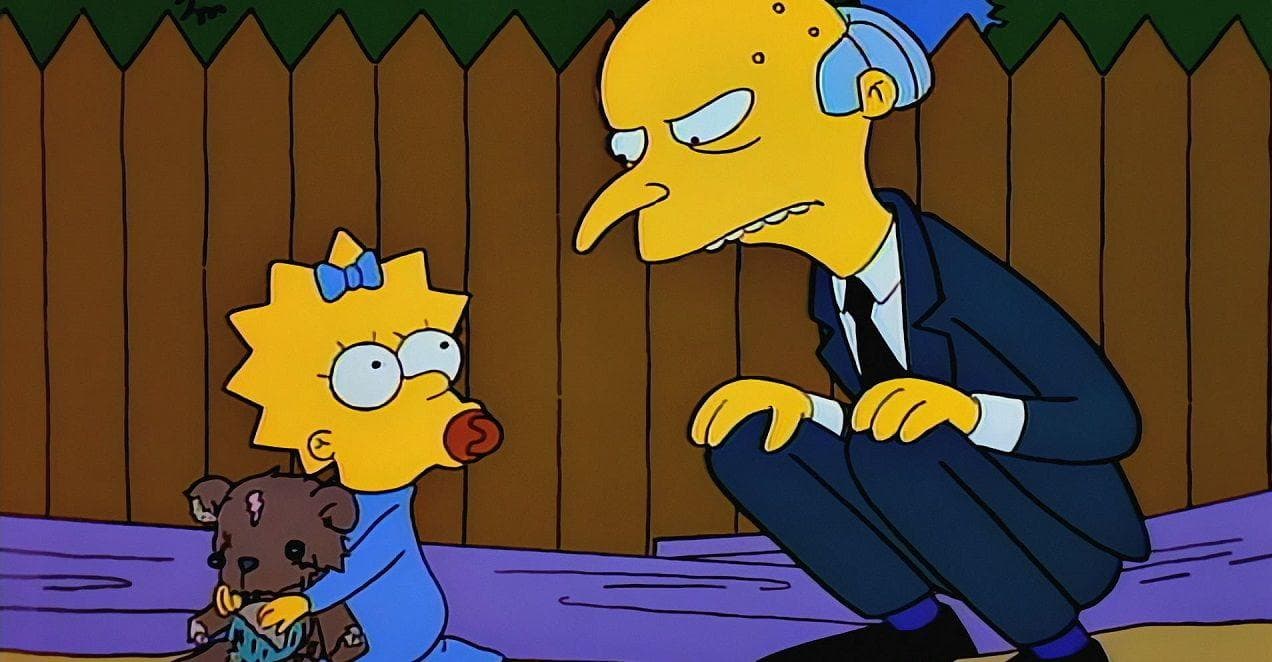
“I’ll never wiggle my bare butt in public again.”
“I’d like to believe that this time. I really would.”
A delve into Mr. Burns’s past, the reasons he is the way he is, by nature involves humanising the man at least a little – which could so easily have devolved into desperately sappy shlock. But even when, in a fit of joy, he declares “From now on, I’m only going to be good and kind to everyone!” it’s setting up the next joke rather than a massive and unprecedented sea change.
Rosebud draws heavily on Orson Welles’s Citizen Kane throughout, but in that special way which only The Simpsons has ever really mastered, where you don’t even need to have heard of Citizen Kane to get what they’re doing. A rich old man trying to find what the episode actually calls “a symbol of (his) lost youth and innocence” is a fruitful enough plot that they don’t need to go baffling everyone in the audience who isn’t a black-and-white film buff.
And for all that the episode is humanising Burns, it doesn’t forget who he is, and shows him at his tyrannical best – inciting lynch mobs and taking over all available television networks, as if he’s launching a coup. His replacement for the scheduled programming, a quite desperately formulaic sitcom, quickly becomes absolutely brilliant in its sheer shoddiness.
24. Lisa’s First Word | Season 4, Episode 10
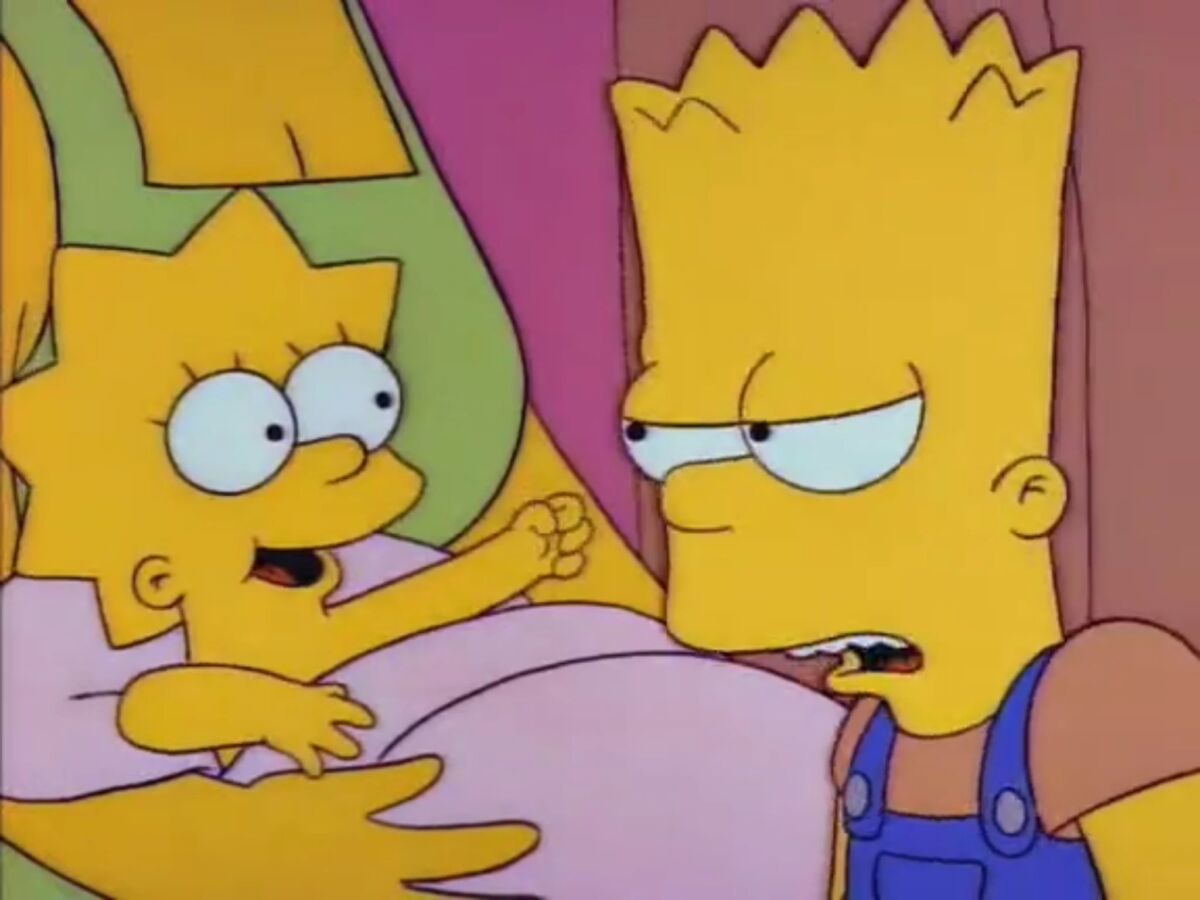
“You know Maggie, the sooner kids talk the sooner they talk back. I hope you never say a word.”
Whenever a TV show opts for an entire flashback episode dedicated to fleshing out the stories not explorable in the current timeline, it can often be a sign that ideas have run dry, or else represents an excuse for self-indulgent schmaltz-ery to curl the toes and have one reaching for the sickbag.
Lisa’s First Word, however, avoids pretty much every trap and pitfall normally made by shows attempting a similar trick. It’s ballistically funny, with the story of the 1984 Summer Olympics free burger giveaway almost bankrupting Krusty, Korean athlete Kim Huang’s broken leg and Homer’s first encounter with the Flanders clan all worthy of the finest episodes of any season ever.
Lisa’s First Word, however, is always anchored by its central theme of sibling jealousy, a younger Bart’s envy of the family’s latest arrival and his fear of displacement as relatable as it is well handled. Brilliantly directed, the episode’s surreal, darker moments, such as the infamous ‘can’t sleep, clown will eat me’ scene evidence a writing room perfectly in tune with the thought processes of a fearful juvenile mind. Lisa’s First Word ending up being Bart’s own name, meanwhile, is a lovely way to spark the pair’s ultimate reconciliation, while the episode’s final scene back in the ‘present day’ still brings a lump to the throat.
23. Radio Bart | Season 3, Episode 13
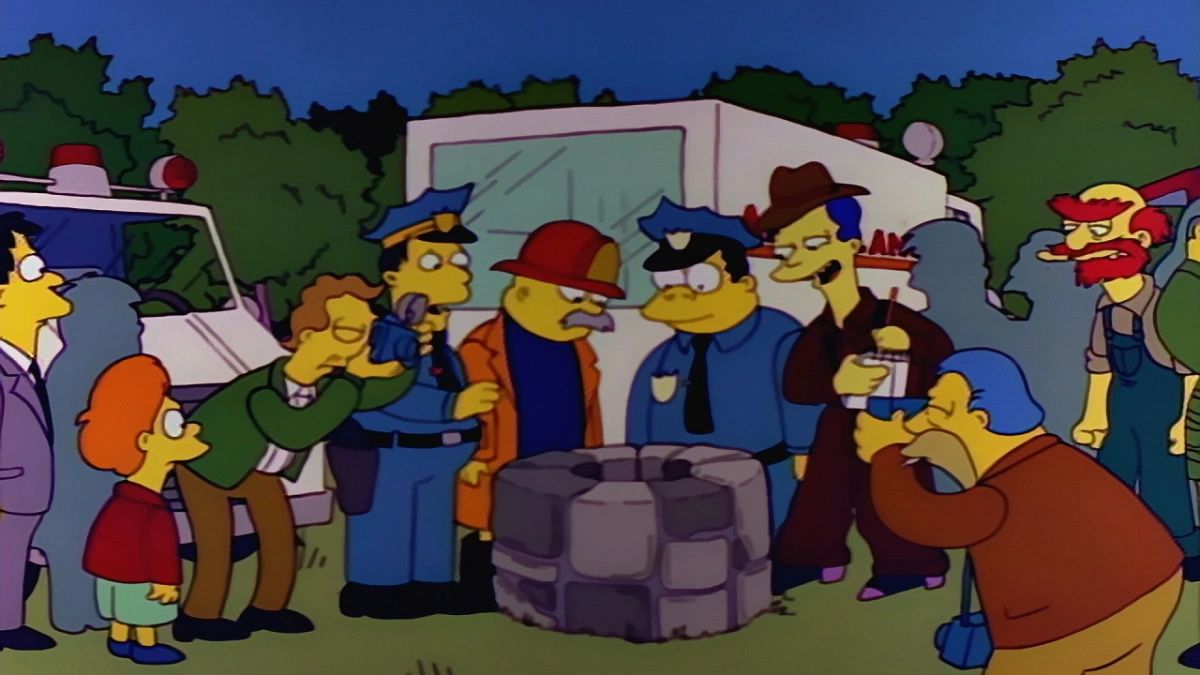
“Timmy’s a real hero.”
“How do you mean, Dad?”
“Well, he fell down a well…and can’t get out.”
How is it, exactly, that the eternally ten-year-old Bart can be celebrating his birthday? We suggest you don’t worry about that sort of thing and just enjoy yourself. The birthday’s a masterclass in disappointment, anyway – from the fairly grim environs of a pizza place run by animatronic animals (now made internationally famous by the Five Nights At Freddy’s games) to a cavalcade of underwhelming presents. Including something the commercials had convinced Homer any boy would love – a special microphone that can broadcast over AM radio.
Bart being Bart, he turns the microphone to nefarious purposes, convincing the whole town that a small boy (the lovably pathetic Timmy O’Toole) is trapped down a disused well. Remarkably, this was a parody of a real incident in 1987, one of those media circuses that seemed more like the media was ready to roll and just needed an excuse. And when Bart finds himself trapped down the same well trying to retrieve the speaker – well, as he puts it, “What did I do to deserve this?”
After considering a string of cockamamie schemes to save the boy, including liquid nitrogen and a charity single (“those limos out back aren’t free. Whatever’s left, we throw down the well”) Homer finally hits on the madcap idea of digging him out. Which they do, with help from special guest star Sting (“he’s a good digger!”). And in the style of all the best The Simpsons episodes, in spite of all that sound and fury absolutely nobody learns a thing.
22. And Maggie Makes Three | Season 6, Episode 13
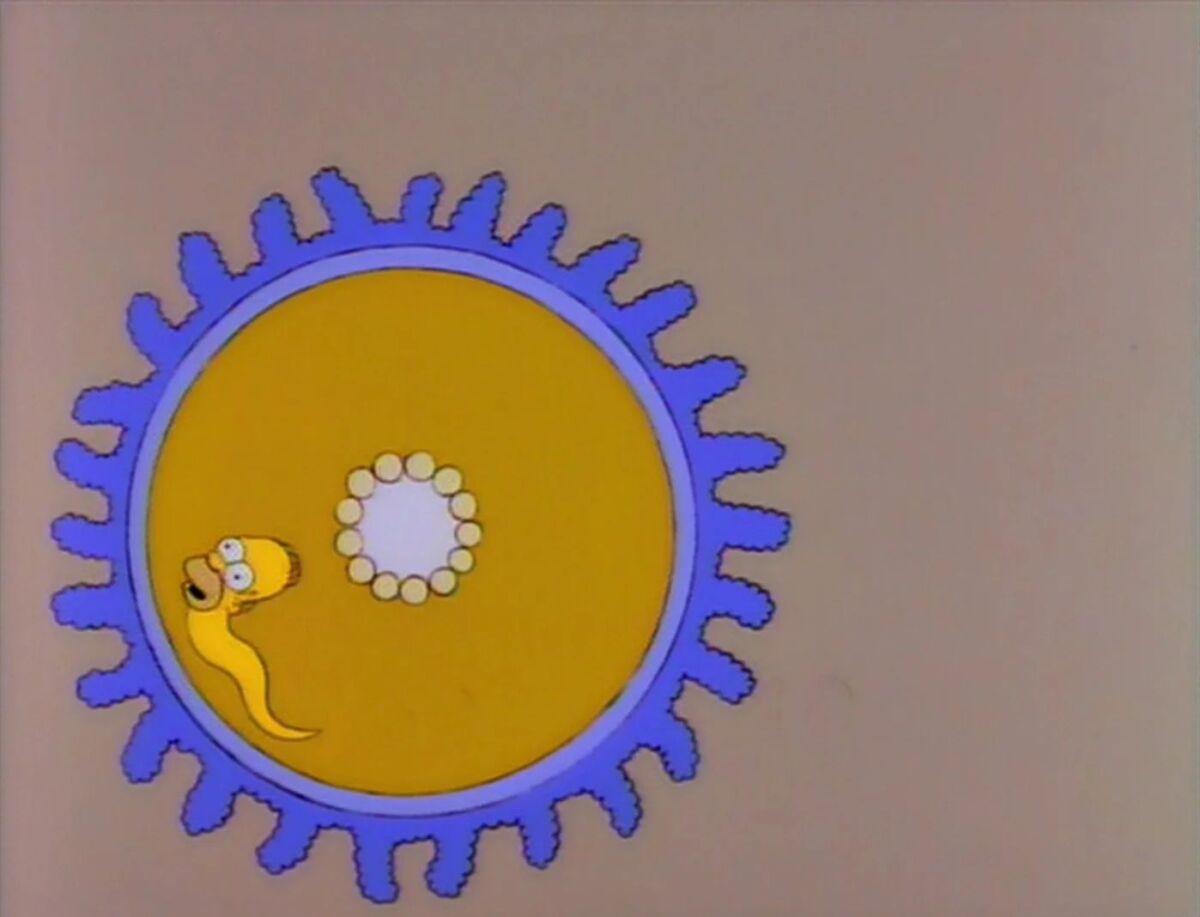
“If horse racing is the sport of kings, then surely, bowling…is a very good sport as well.”
Lisa idly wondering why there are no photos of Maggie in the family album leads us into a tale as old as time: a young couple have just about managed to get their new life as parents in order, only for their throbbing biological urges to promptly chuck another bundle of joy and another grey hair into the mix. To add insult to injury, Maggie’s conception comes after Homer has quit the thankless drudgery of the nuclear power plant (literally burning his bridges on the way out) for the lower-paying but infinitely more fulfilling Eden of the local bowlarama.
For all Homer’s tribulations, though, this is also an episode about Maggie – the one Simpson yet to have the weight of the world crush their spirit, a representation of hope and the future and not making all your old mistakes all bundled into the glistening tear on the cheek of a golden child. Hence the immortal, heart-melting ending, when we learn Homer used Maggie’s baby photos to modify the demotivational plaque (‘don’t forget: you’re here forever’) to read ‘do it for her’.
21. Blood Feud | Season 2, Episode 22

“Senile, eh? Bucktoothed, am I? Bony arms, are they? Liver spots, did I? Chinless, will you?”
Mr. Burns has been capably described before now as a creature whose near-bottomless capacity for evil is limited only by his frail human shell. Here, it nearly fails him when he needs a blood transfusion – and the only person nearby who shares his incredibly rare blood type is Bart.
It’s not a blood feud in the traditional sense, but it quickly becomes a feud. More quickly on one side, with Homer apoplectic at Burns’s ingratitude, by which I mean sending a pleasant thank-you card rather than “a big…thing of riches”. This hypothetical reward comes from a sublime moment of Homer’s unique style of parenting, when he tells Bart the desperately muddled story of ‘Hercules and the lion’, managing to blend Greek legend, Biblical canon, and naked atavism.
No shrinking violent, Homer fires back with a card of his own, a delightfully puerile series of insults that conclude with the assertion Burns smells like the back end of an elephant, fighting words in anyone’s book. After it’s mailed, he quickly and understandably regrets this – leading to the outstanding sequence where he tries, and fails, to outwit the postal service.
20. Bart on the Road | Season 7, Episode 20
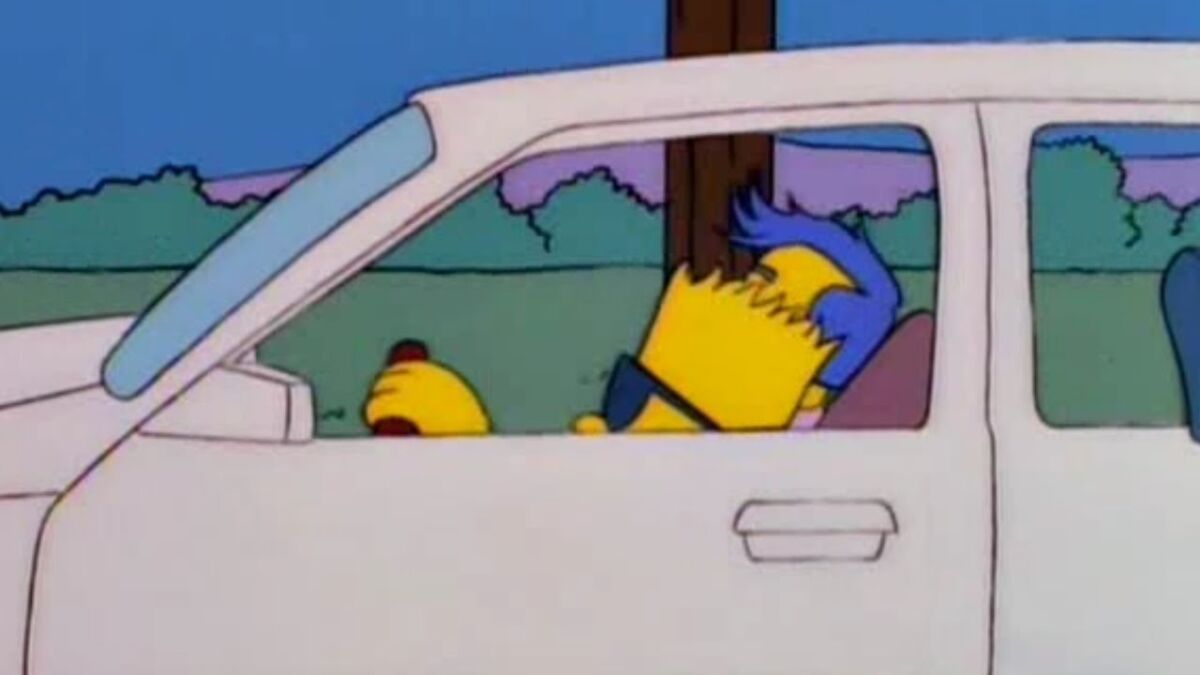
“That’s it! Back to Winnipeg!”
Bart on the Road sees the shackles removed from Springfield’s resident tearaway as Bart and his fellow mismatched classmates Nelson, Milhouse, and Martin make use of the former’s fake driving license in order to rent a car and travel to the World’s Fair in Knoxville, Tennessee. A simple and effective idea, Bart on the Road rides on the chemistry of its four central protagonists, each fulfilling a distinct personality type to create a comically mismatched foursome.
Yet Bart on the Road is actually rendered a classic by virtue of its secondary narrative. In fact, much of the episode’s finest material revolves around Homer and Lisa as the father/daughter duo realise that they have far more in common than they had previously realised. It’s often been a recurring theme on the show that there exists a political and intellectual barrier between reactionary Homer and his more sensitive, liberally-minded daughter, but there’s a refreshing innocence seen in the ways in which the pair interact. Seeing Homer finally able to find ways to communicate his love and admiration for Lisa is a beautiful thing.
19. Boy-Scoutz ‘n the Hood | Season 5, Episode 8
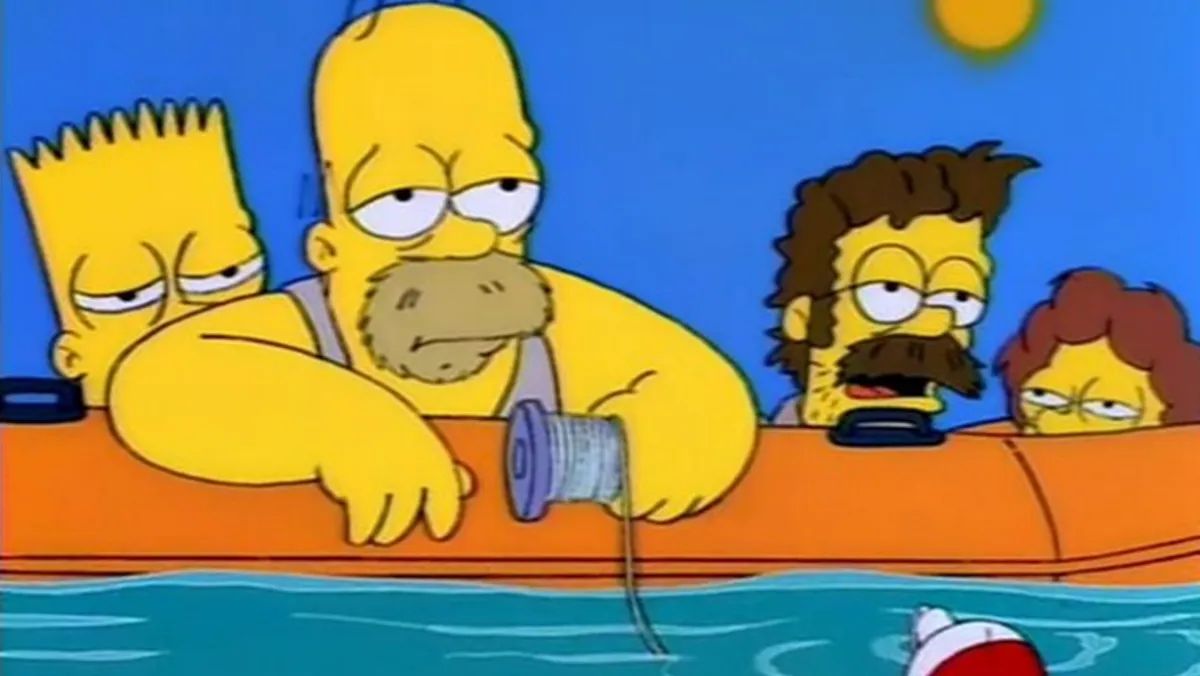
“We’re young, rich and full of sugar. What’ll we do?”
“Let’s go crazy Broadway-style!”
Having expressed the immortal sentiment “money can be exchanged for goods and services”, Boy-Scoutz ‘n the Hood sees fate grant Bart and Milhouse a twenty-dollar bill – which they use to go on a family-friendly version of a night on the town, getting loaded on sugar, getting fake tattoos done, and, in what we must presume was a fit of incapacitated patriotism, signing up with the junior campers.
Homer has never been much of a father, and in turn, Bart isn’t much of a son – so when the Simpson men engage in any sort of parent-child bonding, they’re either doing it by accident, or are teaming up against a greater nemesis. In this case, it’s the former, where their mutual desire not to go on a father-son rafting trip manages to go horribly, horribly wrong.
With a setup like that, you won’t be immensely surprised to hear that the trip itself goes horribly, horribly wrong too, especially when Homer takes charge of the navigation. Still, their party ends up faring better – a lot better – than the doomed expedition of the other junior campers and special guest star Ernest Borgnine, the children’s favourite.
(It’s meant to be a joke that the kids all cheer gruff Airwolf star Borgnine – but not long after that, he landed a recurring role on Spongebob Squarepants, and reality, once again, shifted to be more in line with The Simpsons.)
18. 22 Short Films About Springfield | Season 7, Episode 21
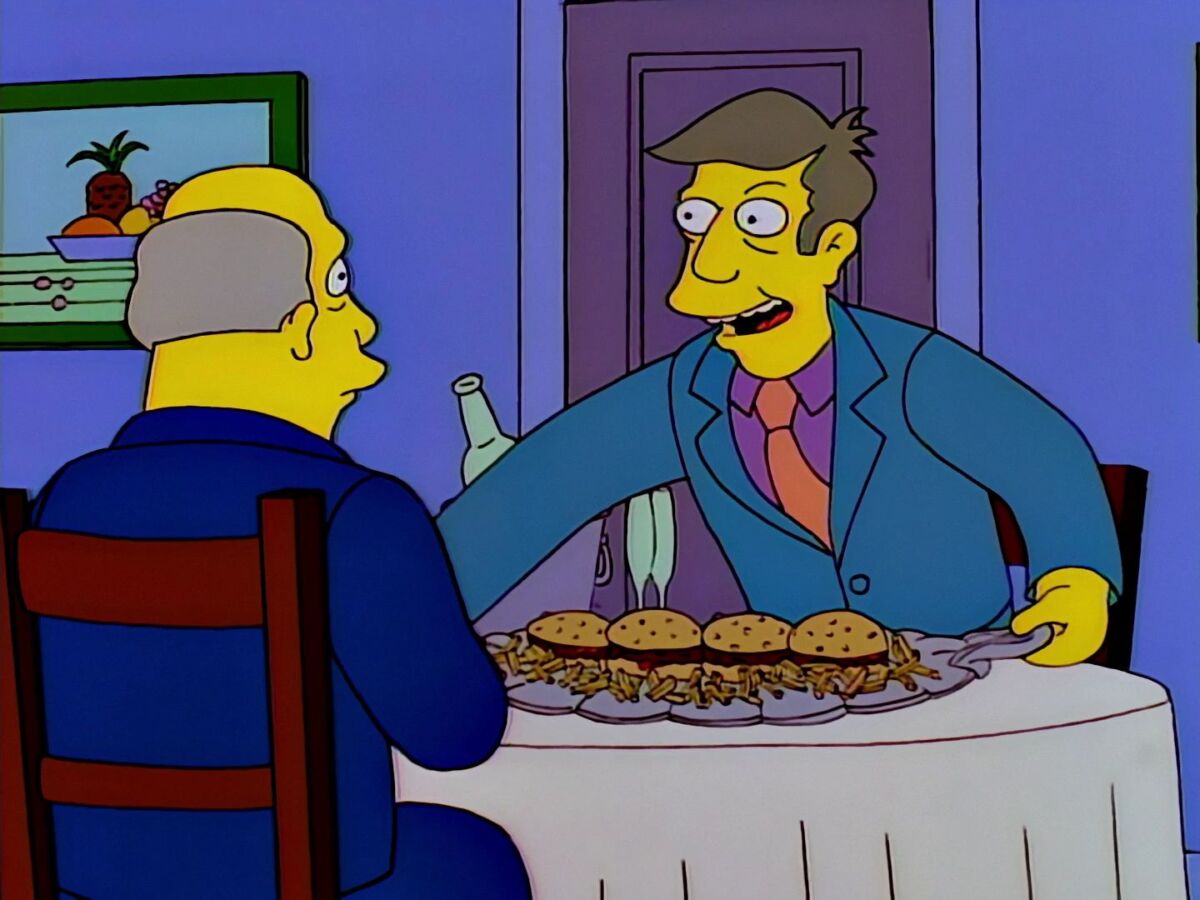
“You call hamburgers steamed hams?”
It’s nice for a show to occasionally take a departure from the norm and experiment with a different format. Ditching the interlocking primary and secondary narrative structure that had characterised most previous instalments, 22 Short Films offers a patchwork of vignettes about life in America’s forgotten town, a semi-parody of Pulp Fiction’s polymorphic narrative setup and a chance to delve into the nooks and crannies of this peculiar settlement and its oddball inhabitants.
22 Short Films is also notable for the fact that it features a vast array of the show’s foremost writers of the Golden Age credited on many of its numerous segments, including Richard Appel, David Cohen, Greg Daniels and Matt Groening himself. It also spawned the infamous ‘Steamed Hams’ meme, the scene in which Principal Skinner attempts to impress Superintendent Chalmers now reimagined online as everything from a Grand Theft Auto mission to a rendition of Smash Mouth’s All-Star. God bless the internet.
17. Bart of Darkness | Season 6, Episode 1
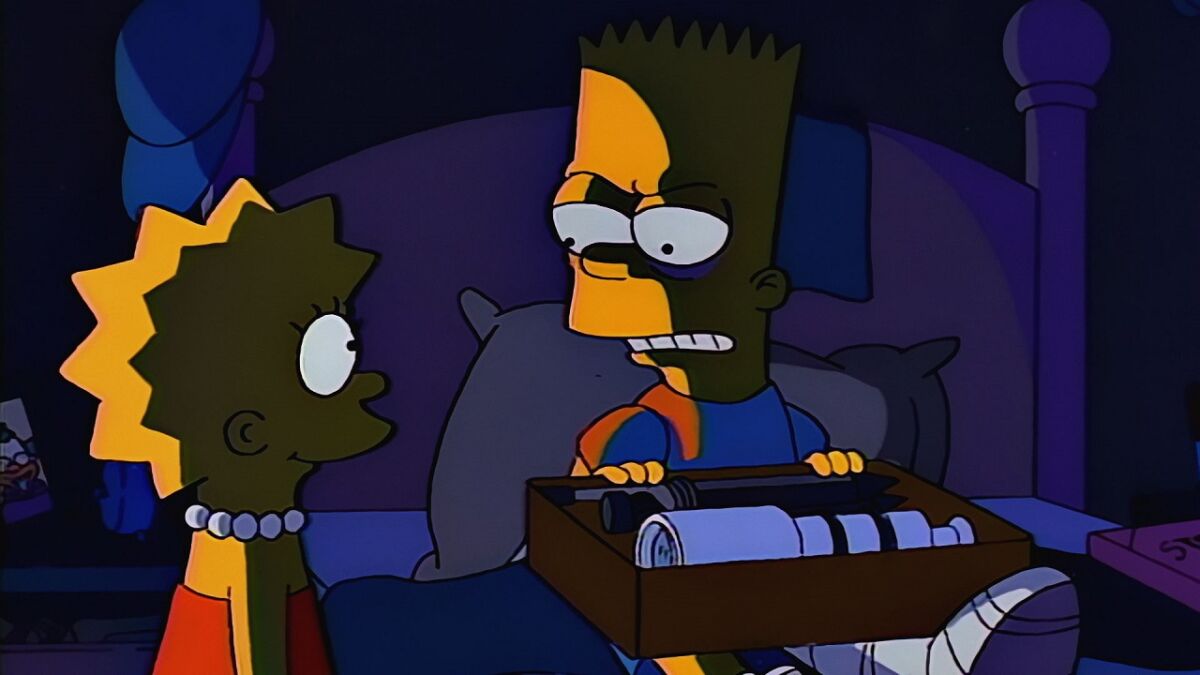
“I’m gonna miss the whole summer.”
“Don’t worry, boy. When you get a job like me, you’ll miss every summer.”
It’s a testament to the sheer versatility of The Simpsons that a fluffy summer plot of the family getting a swimming pool to beat the heat can, with no juddering or jarring, turn on its heel into a nailbiting tribute to iconic thriller movies – most obviously Hitchcock’s ‘Rear Window’. Bart, laid up with a broken leg and a telescope, plays the Jimmy Stewart role of discovering a horrible secret about the neighbours, with Lisa as the plucky Grace Kelly going over there to investigate.
Before that, though, there’s the tangled web of getting the pool in the first place, through the kids’ stymied attempts to cool off (“Ice cream! I’m all out of ice cream!”), the ridiculous yet drawn-from-life Springfield pool-mobile, and Homer somehow turning the raw materials into a barn. And it wouldn’t be irrepressible summer fun if it wasn’t the fact that trying to lay down some basic pool safety rules is what broke Bart’s leg in the first place.
16. A Fish Called Selma | Season 7, Episode 19
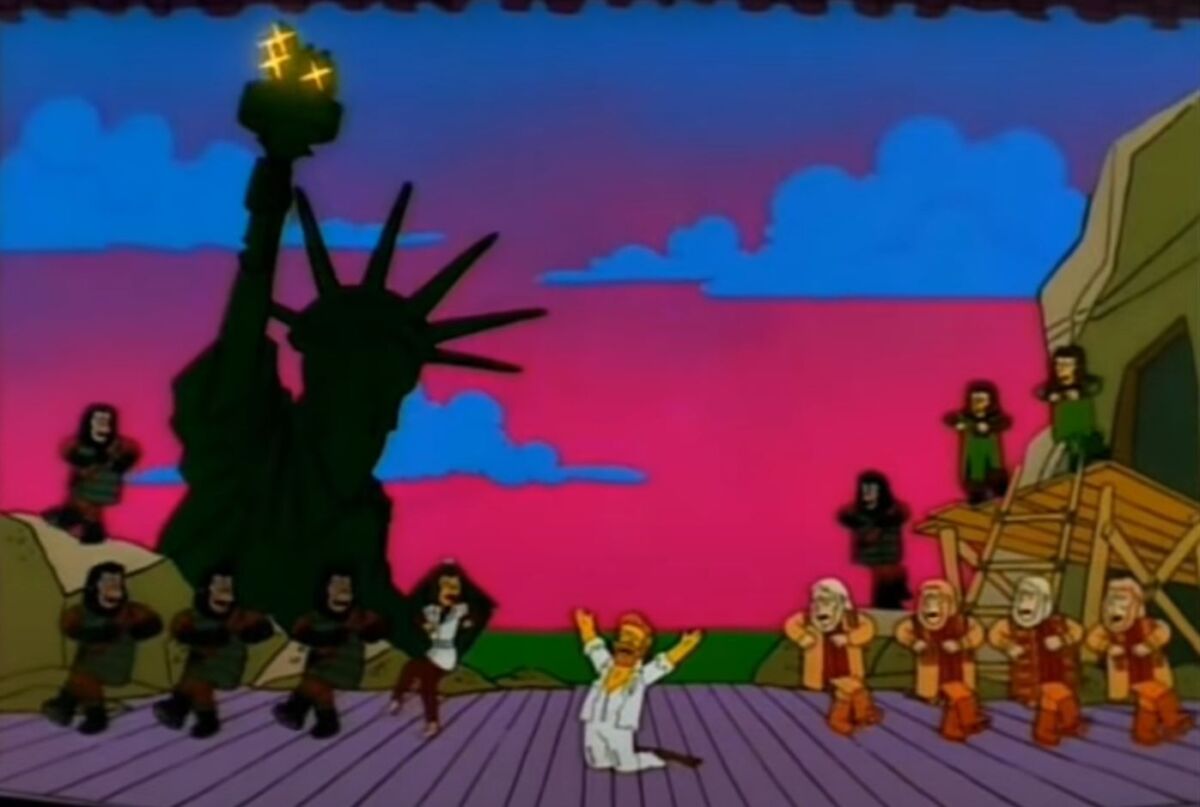
“I hate every ape I see, from Chimpan-A to Chimpan-zee!”
‘Stop the Planet Of The Apes, I Want To Get Off’ may just be the funniest idea for a musical, or indeed any piece of media, ever committed to screen. A Fish Called Selma might have one of Homer’s acerbic sisters-in-law embedded in its title, but this is a Troy McClure special, an entire Hollywood epic condensed into 22 minutes revolving around one of the show’s best incidental characters that ends up one of the best The Simpsons episodes.
McClure had always been perfect for brief cameos, the washed-up actor fronting anything from documentaries on the meat industry to The Muppets Go Medieval, the “You may remember me from…” recurring gag containing many of the sharpest and best-loved lines in the show’s history. Expanding Troy’s backstory to explore the faded thespian’s fall from grace and rumours of his wayward sexual proclivities makes A Fish Called Selma so compelling as McClure uses Marge’s sister as a means to reignite his flagging career. Funny, sharp and written with wit and flair, the fallen star’s feature outing is a brilliant commentary on fame, decline and the artifice of the cynical Hollywood world.
15. Mr. Plow | Season 4, Episode 9
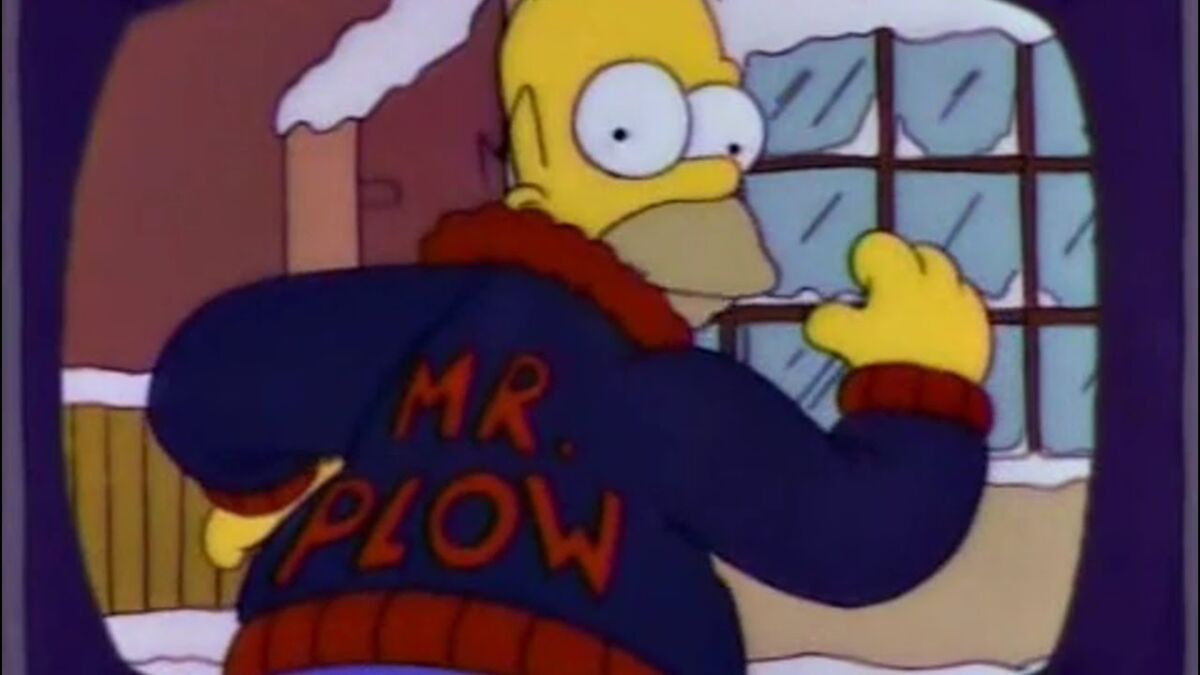
“Dear Lord, in your infinite wisdom…you know the number to call when you need a plow is Klondike 5-3226.”
“Homer, this is really low.”
“Not as low as my low, low prices.”
Looking back over these all-time greats, it’s amazing how much pure gold The Simpsons spun out of perfectly pedestrian activities. ‘Mr Plow’ ultimately boils down to ‘the car gets wrecked, the family buy a new one’. Yet even that, before we get anywhere near a plow or any plow-related activities, produces Homer’s world-beating excuse for where, exactly, he was driving back from through a snowstorm: “It’s a pornography store. I was buying pornography”, delivered with such perfect zen that for a moment you might even wonder why anyone could look askance at that.
Homer’s held many jobs over the years, as the show itself has had its fun with, but snow-plower is tuned just right – it’s not implausible, it’s a trade Homer could do without being arduous enough to put him off, and of course results in the big, bold (and sexually irresistible) Mr. Plow persona. Which is why it also makes sense that Barney, in a surprisingly malevolent turn, can swoop in and steal his thunder as the Plow King.
14. Homer’s Enemy | Season 8, Episode 23
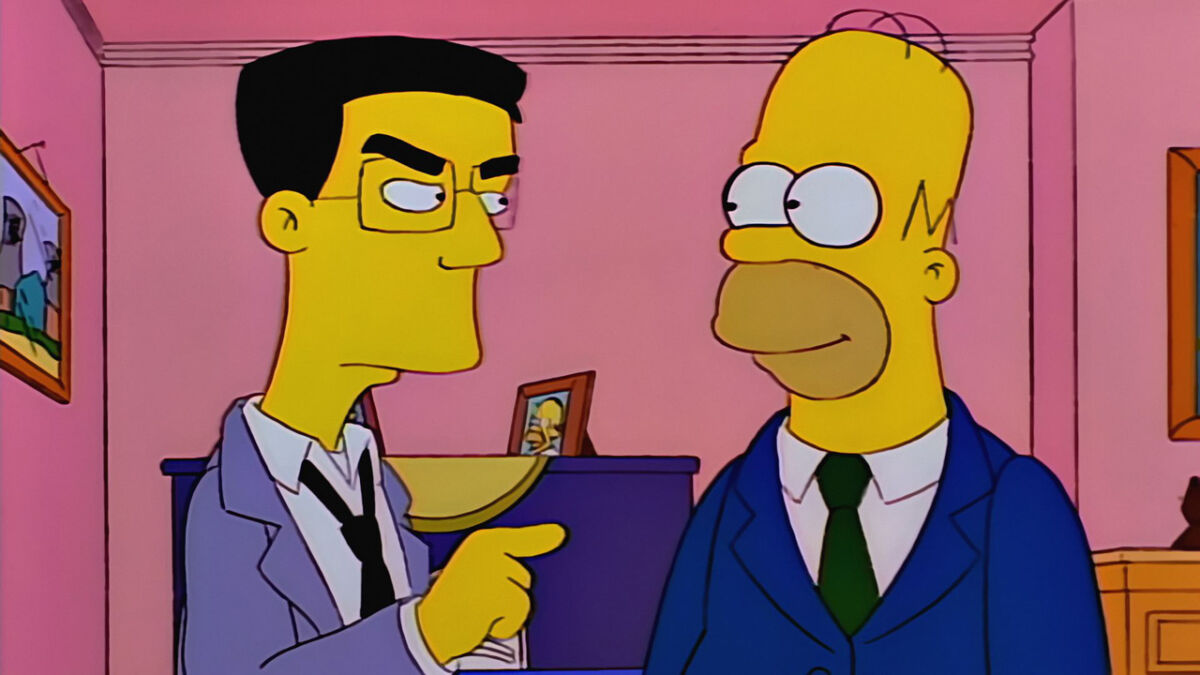
“Stay the hell away from me. Because from now on, we’re enemies.”
“Ok…do I have to do anything?”
Homer’s Enemy initially started as one of the top episodes on this list, but its controversial reputation has seen it drop out of the top 10. While it may be a fantastically funny outing and one of Matt Groening’s favourite episodes of all time, it’s also a darkly comic display of self-awareness that sees the show’s writers finally come to terms with their own beloved creation: Homer himself. While the episode may introduce us to Frank Grimes, the man who “had to work for everything he ever got”, as its initial focus, Homer’s Enemy is far more about the Simpson patriarch than it is about his newfound nemesis.
What Grimes represents is a fourth-wall-breaking mole, a screen shattering agent designed to tell the audience that their comic hero is in fact “a total fraud” and ‘‘what’s wrong with America”, a lazy, leeching and indolent figure whose successes come despite his character, not because of it. This is at the heart of what makes Homer’s Enemy such a special but such a controversial instalment, in that it spells the end of Homer as a loving father trying to make the best for his family to a self-absorbed simpleton capable of driving the only sane man at his workspace to suicidal insanity. It is also exceptionally, cruelly, brilliantly funny, and viewed by itself, there are very few others that can bring the laughs quite like it.
13. King-Size Homer | Season 7, Episode 7
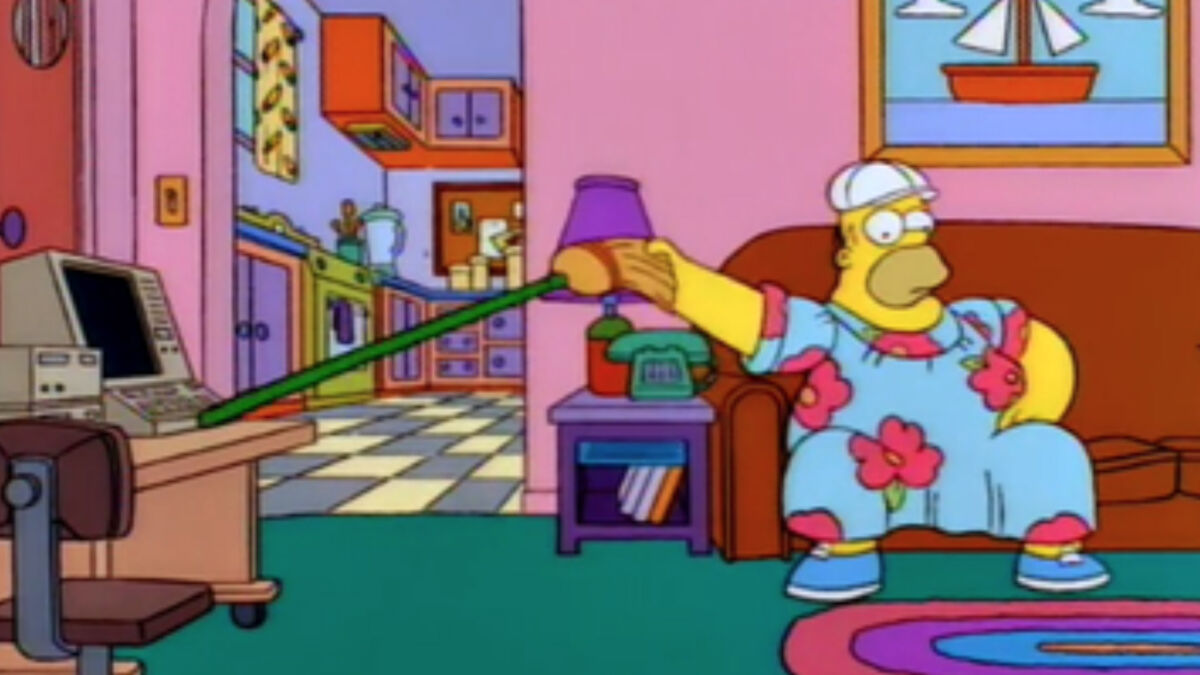
“All my life, I’ve been an obese man trapped inside a fat man’s body.”
Traditionally Homer’s issue with his weight is wanting to lose some – an Icarusean quest which inevitably comes up against the unstoppable forces of the salted, the sugared, the deep-fried, and to a lesser extent the honey-glazed. However, when he discovers he can work from home (and who wouldn’t want to do that?) simply by becoming hyperobese, it’s the golden ticket he’s always been waiting for.
His fantasy of working in a nice, sunny garden, and tangoing with Marge while on the clock, is blemished slightly by the usual unpleasant fascination people show the incredibly fat – and by the inherent risks of taking the cheap approach to the safety of a nuclear power plant. He is later praised for “turning a potential Chernobyl into a mere Three Mile Island”.
Supposedly it took the writers some time to land on the right title for this one. Proposals like ‘Homer the big fat pig’ might have been technically accurate, but didn’t capture the simple joie de vivre Homer shows through his whole plot to become dangerously overweight. As Bart notes, “I know we don’t do a lot together, but helping you gain 61 pounds is something I want to be a part of”. You just don’t get many opportunities to help loved ones with a project like that.
12. Homer the Heretic | Season 4, Episode 3
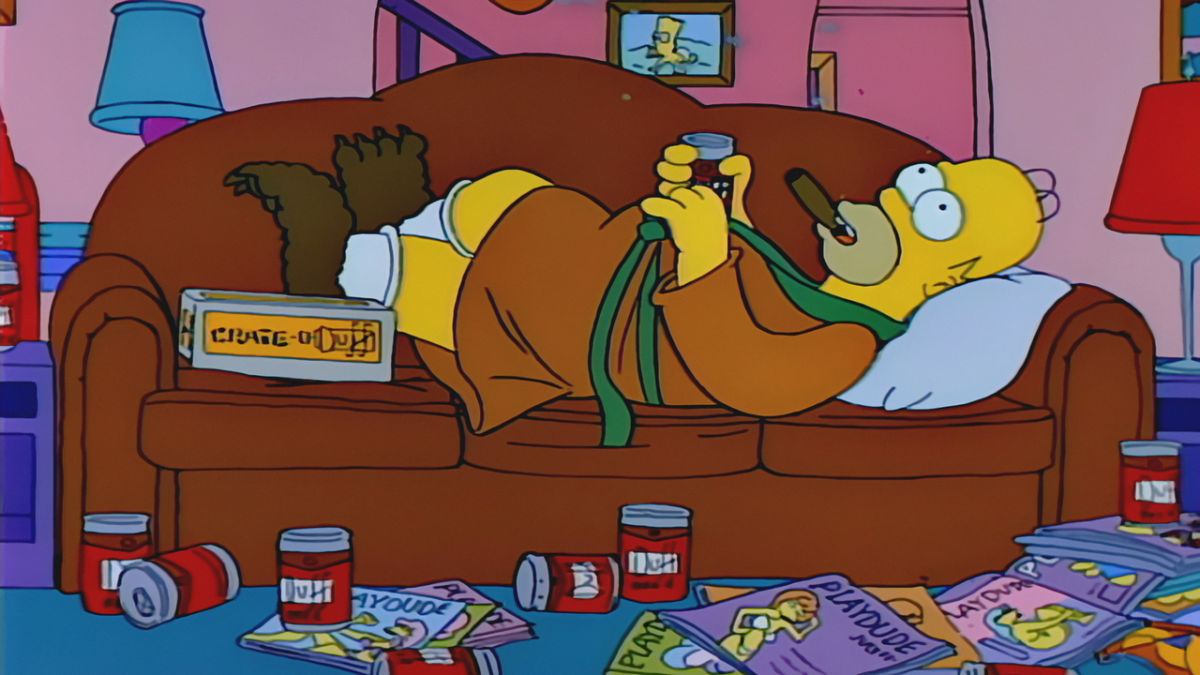
“Boy, everyone is stupid except me.”
It’s never clear with Homer the Heretic as to which side you’re ultimately supposed to be on. Homer may be earning the disapproval of his wife and various segments of the Springfield’s Christian community, but he does make some reasonable points in justifying his decision to skip Sunday church. One senses the voice of writer George Meyer, himself a lapsed Catholic, sounding through as Homer questions why he should devote his day off to sitting in a cold church singing hymns and thinking about eternal damnation in Hell.
Homer the Heretic’s real strength is that it keeps its message open for interpretation. Was Homer being divinely punished for his repentance of God, or was the fire merely the logical result of his slovenly actions and disregard for fire safety? Perhaps the point is that ultimately morality comes not necessarily from religion but from the inherent goodness of Humanity, with Flander’s actions motivated not by his faith but by his admittedly dysfunctional friendship with his slovenly neighbour.
As Ned explains “God didn’t set your house on fire”, Reverend Lovejoy instead suggesting that “He was working in the hearts of your friends and neighbours when they went to your aid, be they Christian, Jew or…miscellaneous”. Aw. Sweet.
11. Homer Goes to College | Season 5, Episode 3
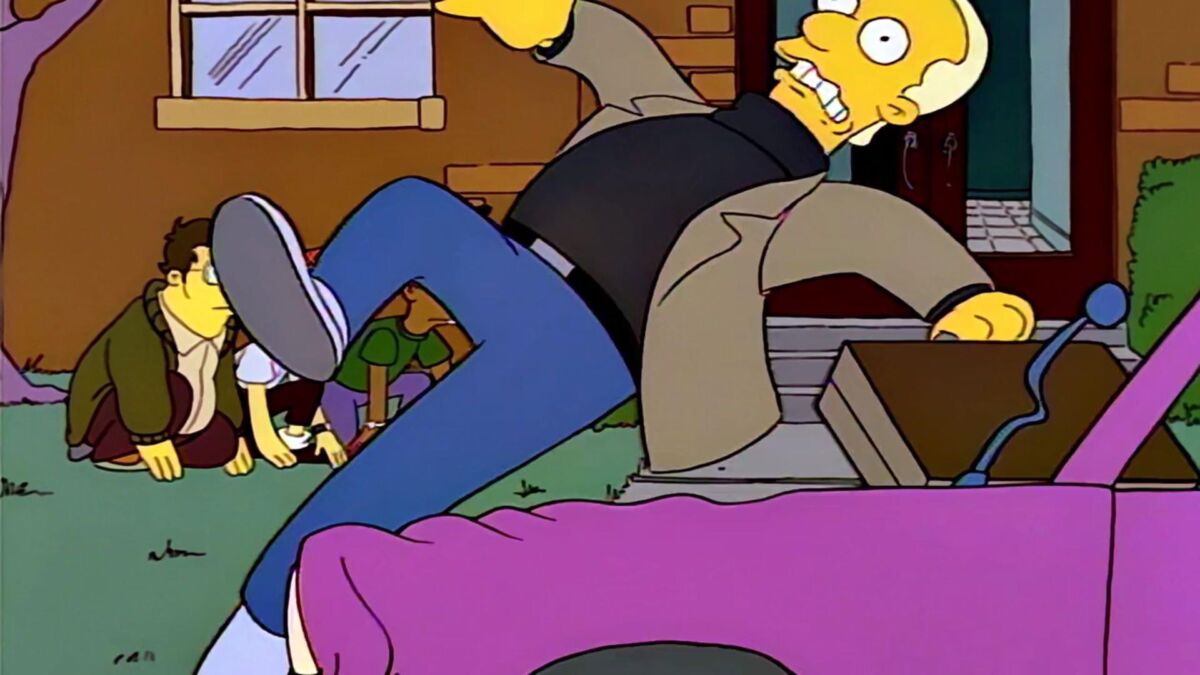
“Someone squeezed all the life out of these kids. And unless movies and TV have lied to me, it’s a crusty, bitter, old dean.”
It might be slightly wanky to describe anything as ‘media about the media’, but that’s what this certainly is: Homer has it in his head that university is really like all those zany college movies, with their pranks and their frats. Inevitably, this screen-burned nitro reacts alarmingly with the glycerine of real life.
Needing to actually learn something about nuclear physics to do his job at a nuclear power plant, Homer finds himself foisted upon an unsuspecting campus full of relatively ordinary people (“Hey, pal! Did you get a load of the nerd?”/”Pardon me?”) and eagerly sets about the wacky shenanigans he believes are the order of the day. As with so many of the Simpsons’ adventures, this nearly kills a man.
Homer’s college pals, a gaggle of shut-in computer nerds, are predictive of an archetype which was only just emerging at the time but is now barely even notable. Meanwhile, his college arch-enemy, “that crusty old Dean”, simply cannot make any amount of general decency or smooth bass have Homer see him as anything other than a joyless martinet. Unlike any film involving frat-boys, this is a college experience nobody will envy.
10. Itchy and Scratchy Land | Season 6, Episode 4
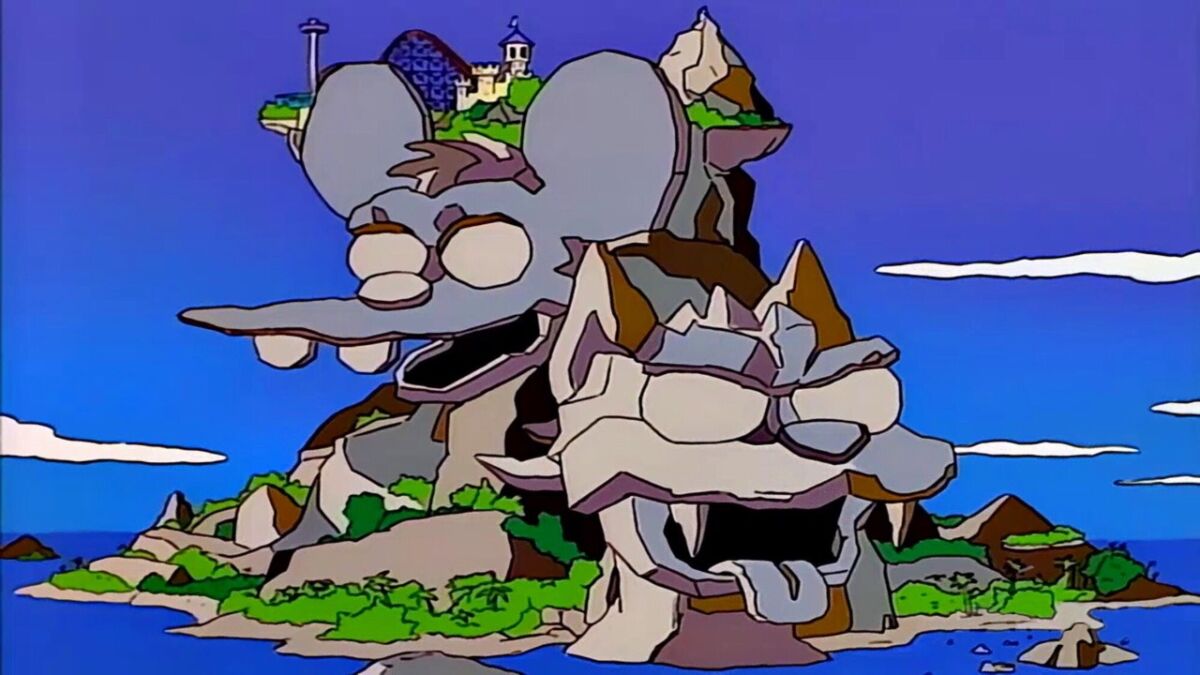
“Attention, Marge Simpson. Your son has been arrested…Attention Marge Simpson. We have also arrested your older, balder, fatter son.”
For an animated show essentially aimed at appealing to a broad spectrum of viewers, The Simpsons is rarely an outwardly ‘cartoonish’ creation. Yes, it makes great use of the medium, but it’s not as much of a nakedly knockabout proposition as the cartoons that inspired or preceded it.
Itchy and Scratchy Land, then, is The Simpsons playing against type, a knowingly goofy and outlandish setup that could’ve been taken from an episode of Scooby-Doo as Springfield’s favourite residents travel to Itchy and Scratchy Land for their annual summer vacation. So far, so standard, the idea of Bart stamping on every poor sucker in an oversized character costume and Homer being arrested for a similar offence all exactly the sort of thing one would expect from the mismatched father-son duo.
It is only in the episode’s final third that things start to play explicitly against type, Homer, Bart, Lisa, Marge and Maggie fighting off hordes of animatronic Itchys and Scratchys in a farce that brings to mind an episode of Westworld set in Disneyland. Which is, of course, the entire point. Very silly, very funny and endlessly quotable, Itchy and Scratchy Land is one of the best The Simpsons episodes, and that’s within an already immensely strong season.
9. Treehouse of Horror V | Season 6, Episode 6
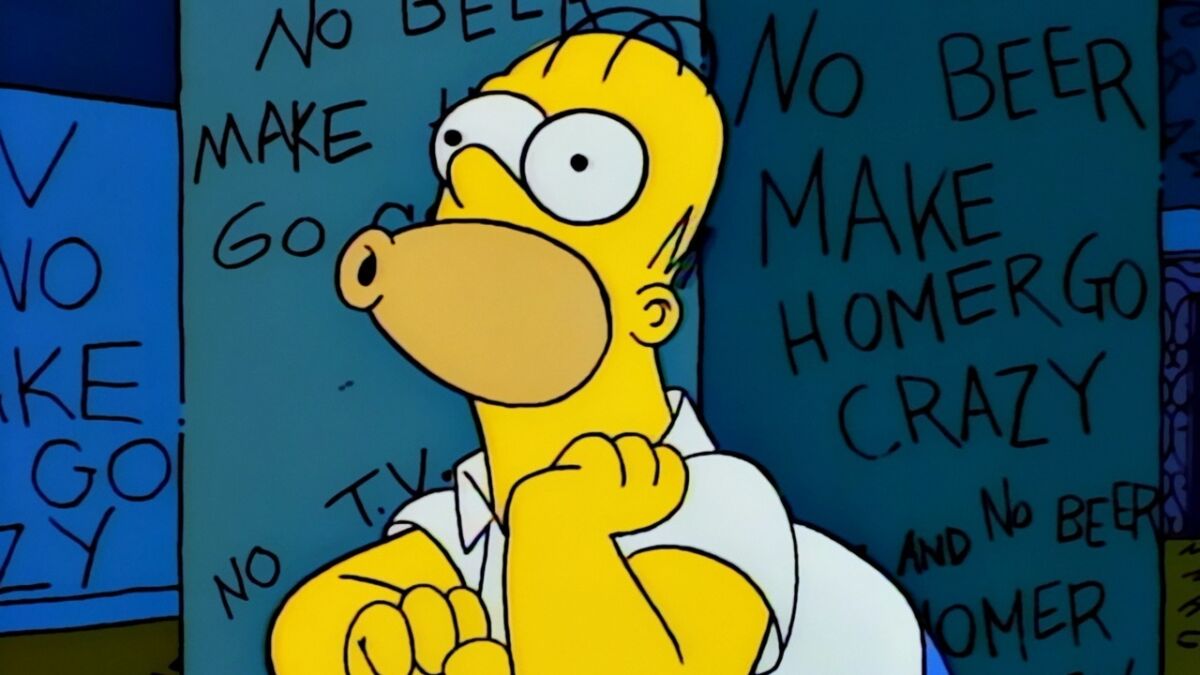
“It seems the show is so scary, Congress won’t even let us show it. Instead they’ve suggested the 1947 classic Glenn Ford movie Two Hundred Miles to Oregon.”
The Treehouses of Horror are still, even now, considered a regular highlight of The Simpsons, and the fifth instalment is the best of an incredibly good bunch. Even if the other two segments weren’t up to snuff, it could have made the list purely on the strength of ‘The Shinning’. Hollywood school should be teaching young comedians that is what a real film parody looks like: it hits all the major plot beats of The Shining, and makes them funny, all in a cool seven minutes flat.
‘Time and Punishment’ takes things sideways into the realm of sci-fi, a genre which any fan could tell you can get scary very quickly just from the scale of the subject matter. The core concept may have come from Ray Bradbury, but a cartoon is the only medium that can really show how badly wrong it can go when you mess with history.
Despite the genuine nastiness of ‘Nightmare Cafeteria’ – no supernatural stuff, science fiction, or film spoofs, just straight-out child murder – the Treehouses aren’t simply scary, but funny-scary. Having a suburban family physically turned inside out by a noxious gas is the kind of thing Eli Roth might balk at. Having them then launch into a musical number is the kind of balance that could only be struck by The Simpsons.
8. Homer’s Triple Bypass | Season 4, Episode 11
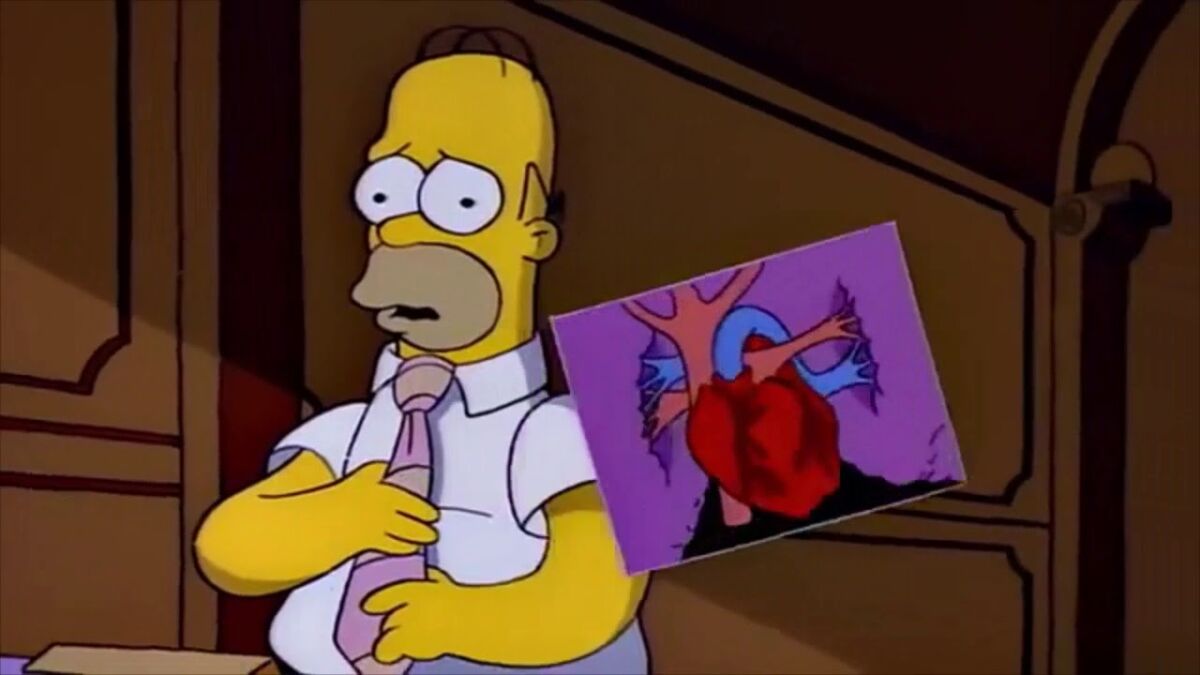
“I keep hearing this horrible irregular thumping noise.”
“It’s your heart. And I think it’s on its last thump.”
“Phew. I was afraid it was my transmission!”
What a rollercoaster of an episode Homer’s Triple Bypass is. It doesn’t always get mentioned in the same breath as the other heavyweights populating the very upper echelons of this modest list, but the eleventh episode of Season 4 should be considered one of the very best. Everything good about The Simpsons is condensed into this perfectly realised little drama.
Homer’s Triple Bypass is excellent from beginning to end, expertly written but also notable for how well it’s directed. The scene in which Homer is fired for his gross incompetence is a sparkling piece of visual framing as Mr. Burns toys with his indolent employee to the extent that Homer eventually succumbs to a massive cardiac arrest, a miniature ‘heart cam’ elevating a good scene into a great one.
It’s the lighter touches mixed in with the goofball antics of what is essentially a potentially fatal situation, however, that really make this a stone-cold classic. The scene in which Bart and Lisa visit their dad, bedbound and nervous about his pending op, is one of the few that can elicit a genuine belly laugh before sucker punching you with a heartbreaking piece of earnest sincerity. We know that, ultimately, things will be ok, but the uncertainty and fear of both Homer and his loved ones is almost too much to bear.
7. Bart vs. Australia | Season 6, Episode 16
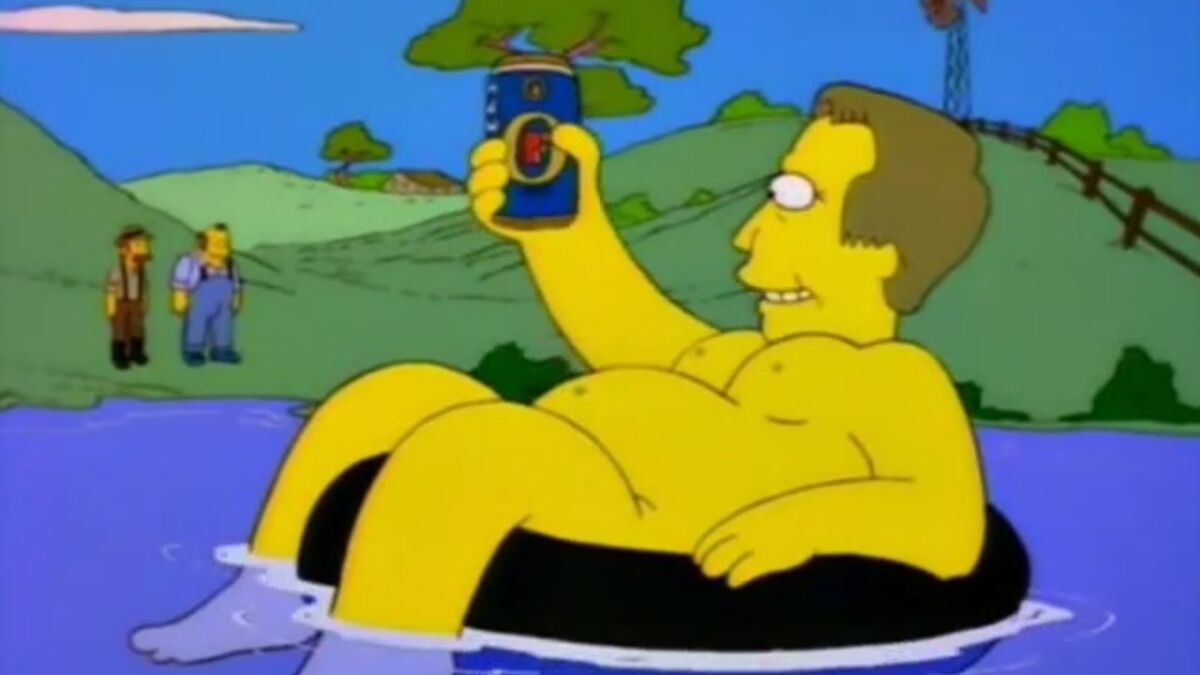
“That’s it! I’m gonna report this to me member of Parliament. Hey, Gus! I got something to report to you!”
Over the years, the Simpsons have made their way to all four corners of the globe, but best of all the travel episodes is surely their trip to Australia – a journey which has probably shaped pop-culture’s image of the lucky country more even than Waltzing Matilda, Ned Kelly, or Scott Morrison’s incontinence.
Need we recount how, exactly, Bart manages to infuriate the entire nation of Australia in the first place? When an unsuspecting country drifts into the gunsights of the Simpson boy, he’ll think of something. Having the whole family go over there for him to give a formal apology is an undressed plot device to get them to today’s locale, sure, but the business of international relations has puked out stupider solutions than that before and will again.
Once over there, it’s a roll-call of proud Australian stereotypes, some well-known (kangaroos, tinnies) and some less so (invasive species, kicking people up the arse). And despite it taking a triumphalist tone of overdog America somehow managing to get the better of a country with a tenth their population and a twentieth their GDP, the episode is an all-time favourite of many of our ‘strayan cousins – who, at one time, made actual calls to change their currency to the Australian dollarydoo.
6. Lemon of Troy | Season 6, Episode 24
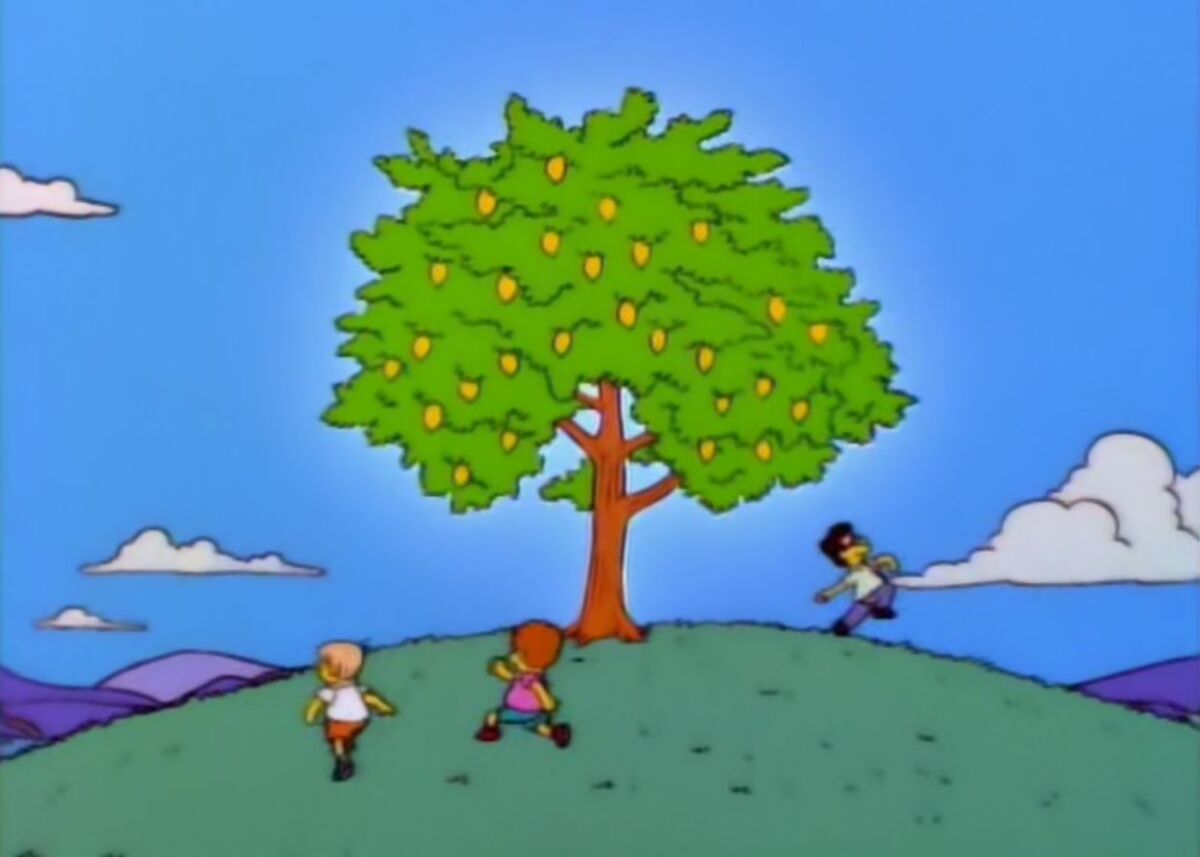
“Now let’s all celebrate with a cool glass of turnip juice.”
Lemon of Troy’s title might be an obvious, and quite hilariously tortured, reference to Homer’s (not that one) epic poem The Iliad and its surrounding mythology, but as a story in and of itself, Lemon of Troy calls back to the American coming of age tales of Mark Twain or Stephen King. There’s certainly a rich debt to King’s Stand By Me (originally The Body) running through Lemon of Troy as the kids of Springfield, flushed with local pride, look to recover the town’s sacred lemon tree from their hated rivals, Shelbyville.
Lemon of Troy is about Springfield’s youths banding together to protect the mythology of their own town’s heritage, lost and afraid in an alien locale but bravely carrying on their crusade regardless. It’s as exciting as it is hilarious, maximised when Homer and his gang of adults, as incompetent and out of their depth as their own offspring, join in recovering the sacred tree. The episode’s closing gag, in which an elderly Shelbyvillian rewrites the story of the loss of the lemon tree to the devious Springfielders, caps off the epic tale in style.
5. Who Shot Mr. Burns? | Season 6, Episode 25/Season 7, Episode 1
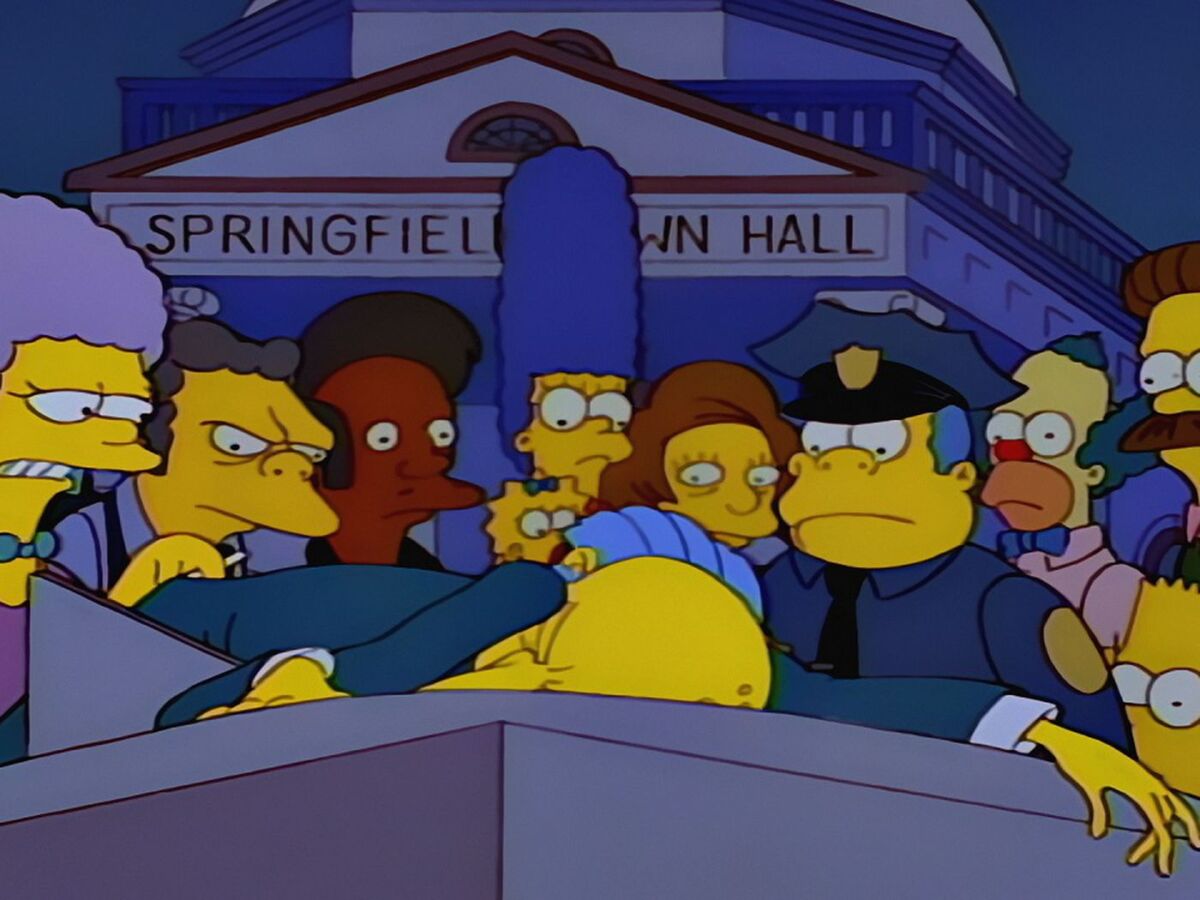
“Dozens of people are gunned down each day in Springfield, but until now none of them was important.”
One of The Simpsons’ rare two-parters, this was riffing heavily on Dallas’s ‘who shot J.R.?’ cliffhanger, but in the years since has completely eclipsed it in the cultural landscape. Nobody’s going back to watch old episodes of Dallas.
Mr. Burns was always the show’s resident villain, but to lay the ground for someone to actually take a shot at the man, the first episode sees him engaging in what the second accurately describes as “cartoonish supervillainy” – bankrupting schools, injuring dogs, taking candy from small children, and all the while leaving a trail of shattered lives in his wake. So, when he turns up with a slug in his chest, it ends up being far, far quicker to sketch out a list of those who wouldn’t have pulled the trigger.
Even his eternal sycophant Smithers isn’t in the clear. In fact, having been summarily dismissed and gone off the rails a little, Smithers quickly becomes one of the prime suspects, alongside guest star and king of Latin jazz Tito Puente.
The culprit turns out to be – well, that would be telling. Dr Hibbert’s teasing little “Well, I couldn’t possibly solve this mystery…can you?” was an open invitation for the viewer at home to try and work it out themselves. And supposedly on the first airing, despite the clues, only one person in all of the show’s massive audience landed on the right answer (which at the time had Vegas odds of an eye-watering 70:1).
4. Homer vs. The 18th Amendment | Season 8, Episode 18
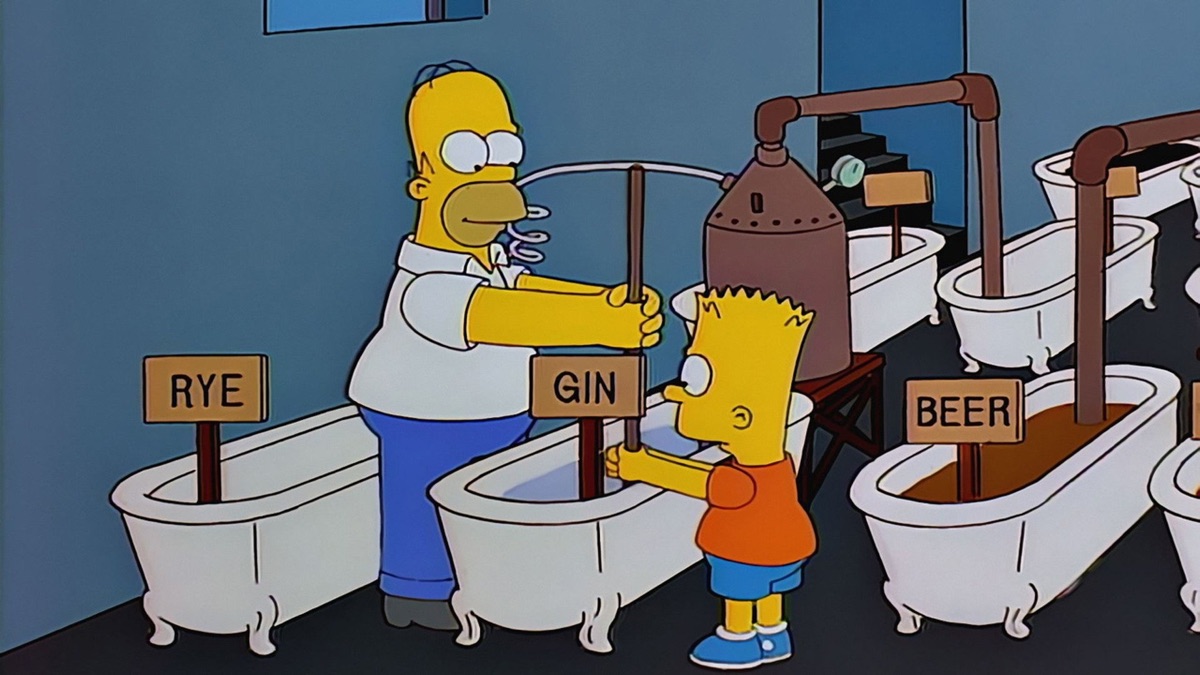
“All this drinking, violence, destruction of property. Are these the things we think of when we think of the Irish?”
The idea of a single American state, let alone a town, even considering the idea of alcohol prohibition in this day and age is, of course, an absurdity, but it didn’t stop the Simpsons’ writers from exploring such a wonderfully ludicrous hypothetical to its glorious logical conclusion.
When Bart is seen staggering around drunk during a St. Patrick’s Day parade, the town’s hysterical outcry causes its citizens to push for prohibition, only for Homer to fight back against the regressive law by first smuggling alcohol and then, inevitably, attempting to distil his own. A love letter to the prohibition era itself and the media that it went on to inspire, in particular 1959’s The Untouchables, Homer vs. the 18th Amendment happily wallows in a different era of gangsters, bootleggers and enforcement agents, of men in trilby hats wielding Tommy guns while radio newsreaders with clipped accents proselytise the ill-effects of that devil alcohol, all despite being set in present-day (1990s) America.
As an evocation of that heady time of conspiracy and subterfuge, it’s second-to-none, while Homer’s role as the notorious Beer Baron sparring with Rex Banner, the humourless parody of real-life enforcer Elliot Ness, creates one of the greatest rivalries in Simpsons history. Homer vs. the 18th Amendment shows the Simpson patriarch at his slyest and his most reckless, but it is his continual evasion of the ruthless Banner that really gives things life. It’s also home to probably my favourite Simpsons exchange of all time. Genius.
3. Last Exit To Springfield | Season 4, Episode 17
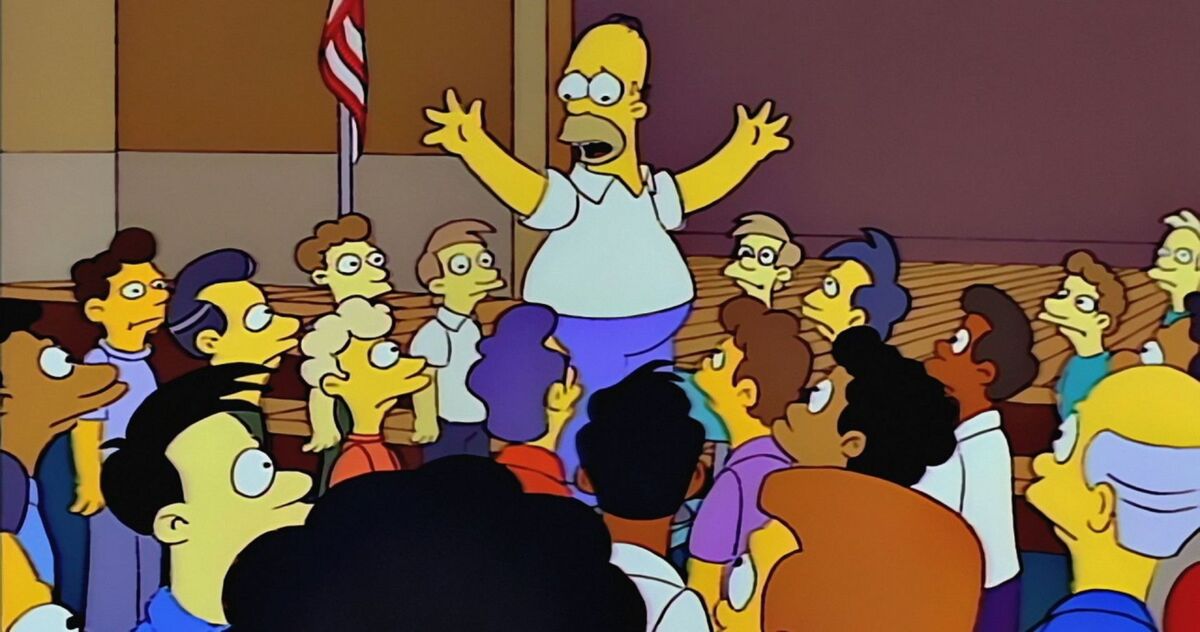
“Mr. Burns, you mentioned you wanted an opening tirade.”
“Yes, thank you, Kent. Fifteen minutes from now, I will wreak a terrible vengeance on this city! No one will be spared! No one!”
Supporting a family of five on a single income certainly seems like laa-laa make-believe today – but even in The Simpsons’ glory days it was a tenuous affair, liable to crumble at the first wrong move, like some big unexpected expense like Lisa needing braces. Thank goodness, then, for the company dental plan, and only a real monster would try to take away medical benefits from children. So that’s exactly what Mr Burns does.
The union nearly go for it, too, but Homer, realising it’s his neck on the line, quickly gets them fired up about all the teeth they’ve enjoyed over the years, and they embrace him for it. Homer is boyishly eager to become kingpin of the union and “make lifelong connections to the world of organized crime”, but his actual negotiations with Mr Burns turn into a glorious comedy of errors. Burns mistakes Homer for a man who’s utterly incorruptible, and Homer mistakes Burns’s overtures for something altogether more saucy.
When the balloon finally goes up and the workers go out on strike, all Burns’s dirty tricks – strikebreakers, power cuts, killer robots – can’t defeat the solidarity of the workers. Chalk up another reason to be surprised Rupert Murdoch ever signed off on this.
2. You Only Move Twice | Season 8, Episode 2
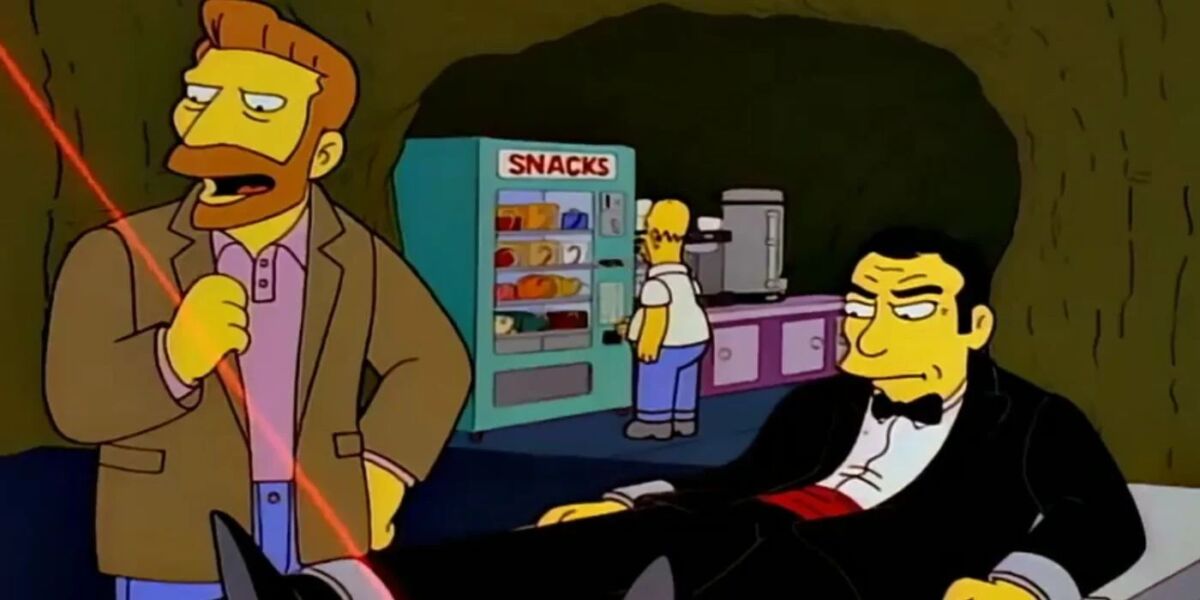
“By the way, Homer, what’s your least favourite country: Italy or France?
“France.”
“Ha. Nobody ever says Italy.”
I’m saying it now: Hank Scorpio is the finest one-off character in Simpsons history. Voiced by Albert Brooks, Hank becomes Homer’s new boss when the latter decides to take a new job at the Globex Corporation in Cypress Creek, a seemingly innocuous company that, as it is soon revealed, has designs for global domination.
Everything about You Only Move Twice works perfectly. It’s such a wonderful concept to have Homer stumble into a job working for a villainous enterprise and then excel despite his blissful ignorance and lack of any real competence. The idea that Hank Scorpio, a man capable of holding the leaders of the free world to ransom and turning a tractor beam on the nations of Europe could be one of the few people to ever give Homer the support and attention he needs is a delicious piece of comedic irony.
The thought that Hank is a better leader than any boss we will likely ever work for, and whose evil machinations are always tempered by a genuine love for his employees, is also a marvellous gag. As Scorpio’s parodic Bond theme attests: “his twisted twin obsessions are his plot to rule the world and his employees’ health.” I could watch You Only Move Twice endlessly and still laugh at Globex’s eccentric leader throwing away a pair of moccasins or inexplicably giving Homer sugar from his trouser pockets.
You Only Move Twice is pretty much peak Simpsons, the gags, be they visual, verbal or situational, lurking around every corner and bursting out of every scene. It’s a little surreal, it’s very clever and, as Homer is forced to give up the life he loves in order to appease his disillusioned family, a tad melancholic too.
1. Marge vs. The Monorail | Season 4, Episode 12
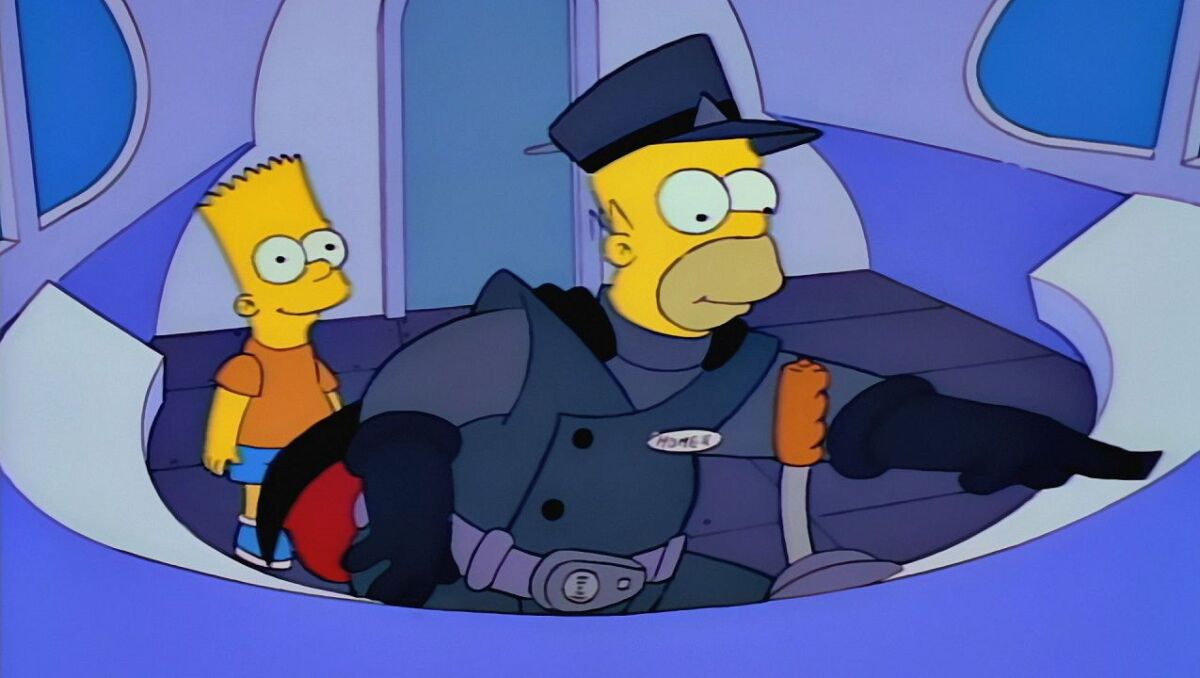
“So then, ‘mono’ means ‘one’, and ‘rail’ means ‘rail’. And that concludes our intensive three-week course.”
As The Simpsons went on, at times it seemed to be slightly torn between the main family and the unexpectedly robust supporting cast it had accumulated. Marge vs. The Monorail conclusively squares that circle, showing once and for all that Springfield’s collective id is pretty much the same as that of the Simpsons themselves.
When Springfield stumbles into an unexpected windfall, what do they decide to blow it on? Presents for all of us? Those guitars that are, like, double guitars? Investing it back into the nuclear plant? Nope, all it takes is one musical number from the evil and charismatic Lyle Lanley (Phil Hartman at his gloriously sleazy best) and they’re dumping it all into a shiny new monorail.
Despite barely knowing the meaning of the word, Homer’s immediately dead set on being the man who drives the thing. Because Lanley doesn’t really care, he gets the job, and quickly makes himself at home as a “mono-thingy guy”, adulating in his son’s respect and inviting a family of possums to live in the cockpit.
The monorail ultimately goes down as “the only folly the people of Springfield ever embarked upon…except for the popsicle-stick skyscraper, and the 50-foot magnifying glass, and that escalator to nowhere”, not to mention other town institutions like the tyre fire, the Matlock expressway, and the Butthead Memorial Auditorium. Some things simply can’t help but leave their mark on the world, and this episode of The Simpsons is surely one of them.
READ MORE: 50 Best Futurama Episodes of All Time
Some of the coverage you find on Cultured Vultures contains affiliate links, which provide us with small commissions based on purchases made from visiting our site.
